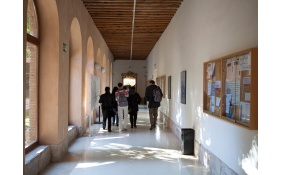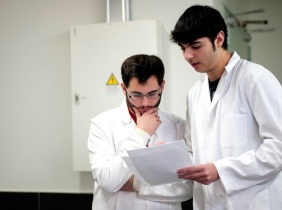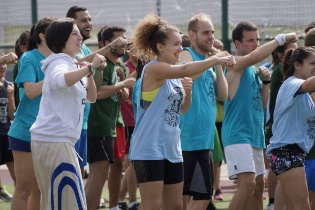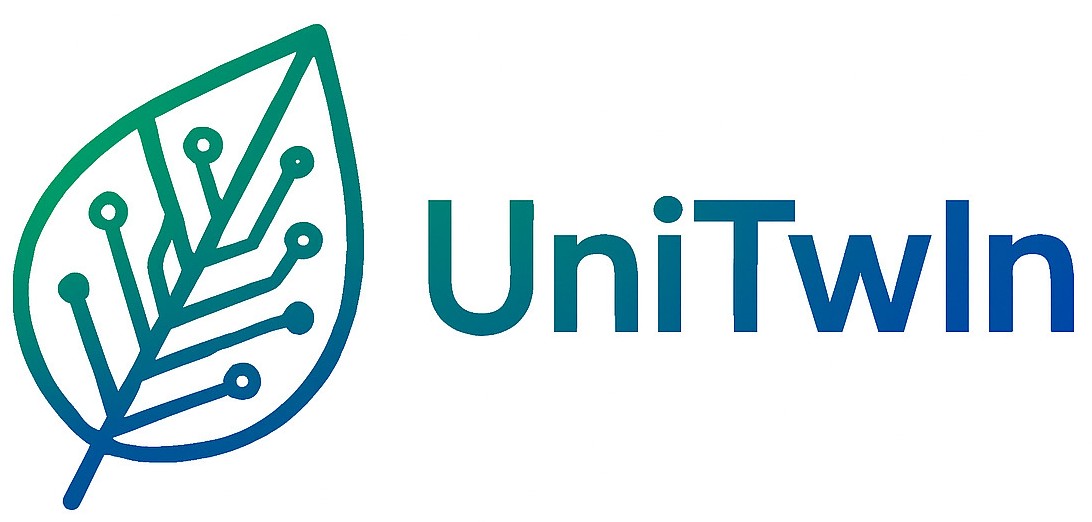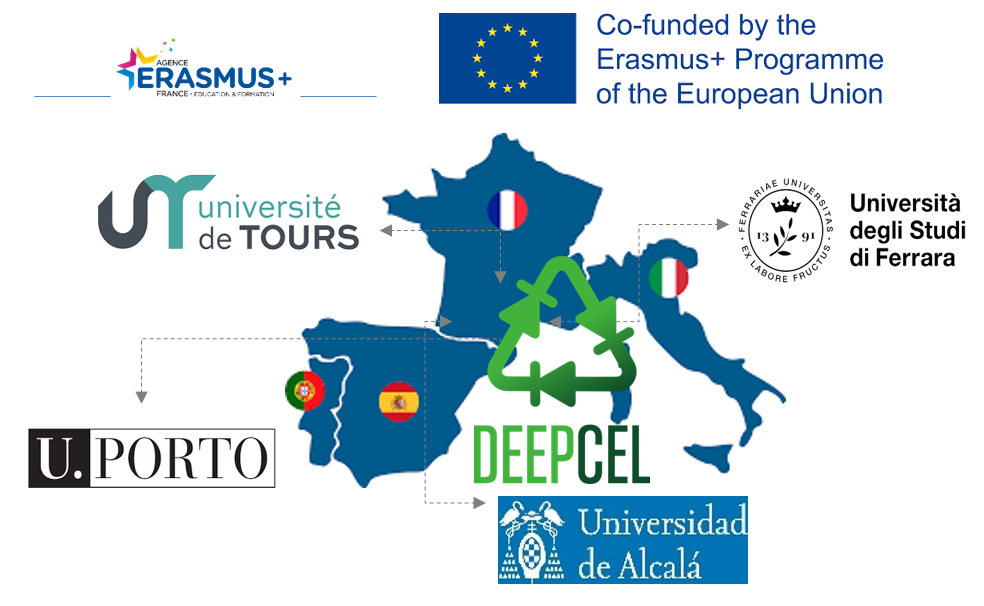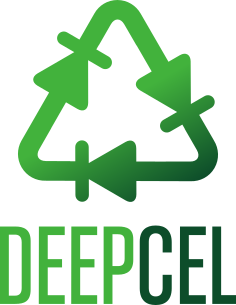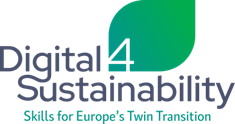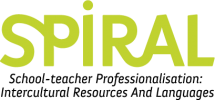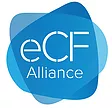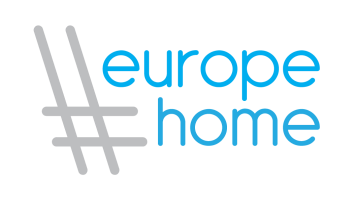Projects
SMARCO - SMARt COmmunities Skills Development in Europe
Topics: SMARCO strives to become a unique one-stop-shop for smart community skills focusing on the three main aims:
Objectives
- To ensure the development of resilient and sustainable smart communities by addressing the skills gaps of smart city engineers and planners/procurers through the development of urgent upskilling courses and forward-looking training programmes;
- to grant flexible and user-centric learning, trans-national dimension and learning mobility, as well as a wide recognition of trainings through the development of micro-credentials, training certificates and wider certification scheme;
- to create a sustainable community of stakeholders to discuss, share and scale training, upskilling and reskilling linked to smart communities’ skills and relevant best practices via participation in the Pact for Skills (and its Digital Large-scale ecosystem) and the organization of roundtables with decision-makers.
Impact:
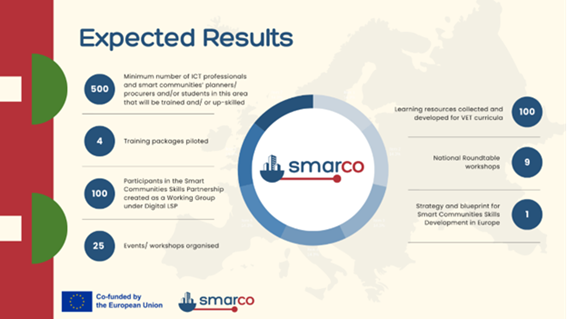
Coordinator: European Digital SME Alliance
Consortium Partners:
CLUJ IT Cluster, BASSCOM, Cluster GAIA, National College of Ireland, Universidad de Alcalá, University of Thessaly, Edutus Egyetem, Hogeschool Utrecht, Hellenic Open University, Politeknika Txorierri, Cefriel, Fondazione Piemonte Innova, Österreichische Computer Gesellschaft, ENoLL, ATI Comunicación, NCSR Demokritos, Emphasys Centre, Nordic Edge, Nicosia Municipality, Forave, and the associated partner DIGITAL SME France.
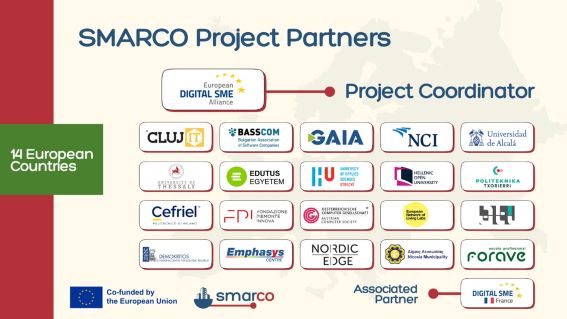
Project details:
Total approved budget: € 3,999,999.98
UAH approved budget: € 196,000 €
Key Action: ERASMUS-EDU-2024-PI-ALL-INNO
Action Type: ERASMUS-LS
Project Reference: 101186291
Project website:
Newsletter: Septiembre 2025
Website: www.smarco.eu
E-mail: info@smarco.eu
Instagram: smarcoproject
LinkedIn: SMARCO Project
YouTube: SMARCO Project
Start Date: 01 Feb 2025
End Date: 31 Ene 2029
Contact person at the UAH: luis.fernandez.sanz@uah.es


DAPHNE - Data journalism Practices from Higher Education towards VET providers
Project Name: Data journalism Practices from Higher Education towards VET providers
Acronym: Daphne
Objectives:
Data Journalism, and more generally, Data-based Communication represents a rapidly growing experience in HE courses and professional. training in European countries since the media and news systems are facing a real “data deluge” due to the COVID-19 pandemic. In this context, news and communication professionals are asked to deal with this data in a systematic and scientific way, in the daily production of journalistic and communication content.
DAPHnE aims to promote knowledge exchange and multidisciplinary teaching and learning innovation, which concerns providing all knowledge and skills, from fields such as data science, statistics, visualization, and communication, necessary to fruitfully operate in the Data Journalism and Data Communication frameworks.
Project details:
DG / Agency: EACEA
Key Action: ERASMUS-EDU-2025-PI-ALL-INNO-EDU-ENTERP
Reference: 101243032
Coordinator: Universita Degli Studi Di Roma Tor Vergata (Unitov)
Consortium Partners: Universidade Nova de Lisboa, Aristotle University of Thessaloniki, EVODEVO SRL (empresa), INOVA+ – Innovation Services, SA (empresa), Universidad de Alcalá, Instituto Politécnico da Guarda, Centro per la Cooperazione Internazionale – International Cooperation Centre (empresa), Formación para el Desarrollo e Inserción, SL – DEFOIN (empresa), Ordine dei Giornalisti – Consiglio Regionale della Lombardia (empresa), Datapitch SRLS (empresa).
Total approved budget: € 1,458,646.79
UAH approved budget: € 122.370,34
Website:
Start Date: 01/Dec/2025
End Date: 30/Nov/2028
Contact person at the UAH: vera.pospelova y luis.fernandez.sanz@uah.e
UniTwIn - University Infrastructure for Workforce Development focusing on Twin Transition
-
develop and upgrade career guidance and training hubs in partner universities to support green and digital skills development, with particular attention to Ukrainian HEIs under conditions of crisis and reconstruction.
-
design joint training modules, micro‑credentials and flexible learning pathways that embed competencies for the green transition (energy efficiency, circular economy) and the digital transition (data, automation, online collaboration).
-
build sustainable networks between EU and Ukrainian universities for knowledge exchange, staff development and co-creation of educational resources and services oriented to workforce development.
-
Lviv Polytechnic National University (Ukraine)
-
KTH Royal Institute of Technology (Sweden)
-
Simon Kuznets Kharkiv National University of Economics (Ukraine)
-
University of Alcalá – UAH (Spain)
-
Lutsk National Technical University (Ukraine)
-
State University of Trade and Economics (Ukraine)
-
Sumy National Agrarian University (Ukraine)
Website: https://unitwin.lpnu.ua
DEEPCEL - The Digital Electronic with Eco-designed Paradigm in Collaborative Enhanced Learning
Summary:
In a tense environmental and geopolitical context, shortages of strategic materials and electronic chips are a growing threat. Electronic waste continues to accumulate, and collection and recycling efforts are still inadequate. We want to raise awareness of these realities, to teach life cycle assessment applied to electronics, and to promote best practices in sustainability, eco-design, reuse, upgradeability, and reconfigurability in digital electronics.
We will organize initial training (E1) for teachers on methodology (life-cycle analysis, eco-design, recycling, urban mining, etc.) applied in the field of eco-transition in digital electronics education (WP2). The project will work on the development of modular electronics educational solutions (WP3) introducing sustainability, eco-design in electronics and use cases. Retrofittable electronics (WP4) will be proposed organizing two summer schools (E2, E3) with an impactful final workshop (E4).
MMM - Mobile Mind in Motions
The Mobile Minds in Motion project's vision is to foster a healthy and sustainable mobility environment by promoting mental health prevention among Erasmus+ students.
The Mobile Minds in Motion (MMM) project will map the preventive aspects of the mental health issues of mobile students and conduct surveys and focus groups to better understand the topic. Based on these findings, it will develop educational materials and a self-assessment tool, piloted through webinars and workshops, as well as will disseminate all findings and materials through awareness raising campaigns, webinars, national events and build the online community of MMM.
Digital4Sustainability
Topics:
Objectives
Digital4Sustainability will focus on fast-tracking the Digital & Green Transition within the ICT sector and throughout European Industry, helping companies to adopt advanced digital technologies to achieve their sustainability goals.
The project's goal is to design a new Digital Sustainability Skills Strategy and an innovative Training Programme that will provide companies with the advanced digital and green skills they need to build concrete ESG initiatives that deliver real results.
Impact
At the heart of Digital4Sustainability lies the ambition to address the urgent and emerging skills needs of industry in the key areas of Digital & Green. We are committed to developing a new Skills Strategy and VET/HE Learning Programmes tailored to train a new breed of Digital Sustainability Professionals. Through partnerships with VET providers and Higher Education Institutions, we will facilitate the re/upskilling of the existing ICT and Industry workforce, enabling them to thrive in a rapidly evolving digital landscape.
Coordinator: DIGITALEUROPE, Belgium
Consortium Partners:
- Adecco Formazione, Italy
- Adecco Italia Holding, Italy
- As Bcs Koolitus BCS, Estonia
- Asociatia Cluj It, Romania
- Badgebox, Italy
- CEFRIEL Societa Consortile A Responsabilita Limitata, Italy
- Cooperatie Eduserpro U.A., Netherlands
- Digital Technology Skills Limited, Ireland
- DIGITALEUROPE, Belgium
- European DIGITAL SME Alliance, Belgium
- Fast Lane, Germany
- Gospodarska Zbornica Slovenije, Slovenia
- Gospodarska Zbornica Slovenije Center Za Poslovno Usposabljanje, Slovenia
- IVSZ - Digitalis Vallalkozasok Szovetsege, Hungary
- Matrix Internet, Ireland
- National College Of Ireland, Ireland
- Profil Klett, Croatia
- Sdruzenie Bulgarska Asociacia Na Softuernite Kompanii Bascom, Bulgaria
- Stichting Hogeschool Utrecht, Netherlands
- Tekenable, Ireland
- Universidad De Alcala, Spain
- Universidad Internacional De La Rioja SA, Spain
- Universitat Koblenz, Germany
- POLITEHNICA Bucharest, Romania
Associated Partners
- Asociacija Infobal, Lithuania
- Fraunhofer Gesellschaft, Germany
- Skillnet , Ireland
- The Council of European Professional Informatics Societies Belgium
- Universidad Complutense De Madrid, Spain

Project details:
Total approved budget: €3,997,230.00
UAH approved budget: 230.896
Key Action: ERASMUS-EDU-2023-PI-ALL-INNO
Action Type: ERASMUS-LS
Project Reference:
Project website: digital4sustainability.eu
Start Date: 01-02-2024
End Date: 01-02-2028
Contact person at the UAH: luis.fernandez.sanz@uah.es
Funded by the European Union. Views and opinions expressed are however those of the author(s) only and do not necessarily reflect those of the European Union or the European Education and Culture Executive Agency (EACEA). Neither the European Union nor EACEA can be held responsible for them.


GEMS - Graceful Equalising of Mechatronics Students
Topics:
Objectives
The Objective of this project is to create an educational system for mechatronics students that gives the students an opportunity to learn using real mechatronic hardware. Many students have specific learning needs but want to learn and want to be included in the educational process like everyone else. That is why we propose that all students get their own educational hardware with online support (MOOCs) to be able to adjust practical mechatronics study to their needs.
Activities
Activities of this project will be mechatronic educational hardware development, creation of supporting mechatronics courses and tutorials in the form of MOOCs, development of platforms for the hardware re-use or sharing and project results promotion. Finally, 4 mechatronics summer schools for university students will be implemented to evaluate the developed hardware and MOOCs.
All work packages will have an activity sequence of specification definition, development, evaluation and modification.
Impact
Results of the project will be:
- Educational hardware in the form of smart servo motor will provide students with a device that equally represents all three study fields of mechatronics.
- Online mechatronic courses and tutorials in the form of MOOCs will support students’ learning with the hardware at university and at home.
The project results will be shown to be ready for ecologically responsible use in the university mechatronics education process to equalise the mechatronics students.
Coordinator: UNIVERZA V LJUBLJANI (Slovenia).
Consortium Partners: TEACHING FACTORY COMPETENCE CENTERUPSKILLING AND TRAINING DEVELOPMENTAND IMPLEMENTATION OF ADVANCED TECHNOLOGIES FOR THE MANUFACTURING IND (Greece) | TECHNISCHE UNIVERSITEIT DELFT (Netherlands) | UNIVERSIDAD DE ALCALÁ (Spain).
Project details:
Total approved budget: 400.000,00 EUR
UAH approved budget: 98.000,00 EUR
Key Action: ERASMUS-EDU-2022-CBHE - Capacity building in the field of higher education
Action Type: KA220 -Cooperation partnerships in higher education
Project Reference: 2022-1-SI01-KA220-HED-000087727
Erasmus Project Result:https://erasmus-plus.ec.europa.eu/projects/search/details/2022-1-SI01-KA220-HED-000087727
Project website: GEMS Erasmus+ – Educational project (uni-lj.si)
Start Date: 01-11-2022
End Date: 31-10-2025
Contact person at the UAH: Marta Marrón Romera (marta.marron@uah.es)
AFID - Providing of Academic Freedom and Inclusion through Digitalization
Topics:
A Europe fit for the digital age Empowering people through education and skills| The right environment for digital networks and services| Innovation in learning | teaching and assessment practices | Inclusion | Digitalization | Interoperability.
Summary:
Project AFID (CBHE with Ukraine) aims to build an inclusive environment for Ukranian students and teachers using an inclusive virtual campus, which will be accessible to a wide range of consumers of educational services through digital tools. The direct AFID’s beneficiaries will be not only current students and teachers from partner universities but also prospective students, adults in need of LLL, people with special educational problems, NEET and others. Besides the 4 Ukrainian universities, there are other 3 universities from Erasmus partner countries Sweden, Portugal and Spain). University of Alcala will develop the guidelines and training materials for the new learning methodologies to be used in the MVIIC.
Coordinator: KUNGLIGA TEKNISKA HOEGSKOLAN (KTH - Sweden).
Consortium Partners: UNIVERSIDADE DE LISBOA (Portugal) | KYIV NATIONAL UNIVERSITY OF TRADE AND ECONOMICS (Ukraine) | LVIV POLYTECHNIC NATIONAL UNIVERSITY (Ukraine) | SIMON KUZNETS KHARKIV NATIONAL UNIVERSITY OF ECONOMICS (Ukraine) | DNIPRO UNIVERSITY OF TECHNOLOGY () | Civic Synergy (Ukraine) | UNIVERSIDAD DE ALCALÁ (Spain).
Project details:
Total approved budget: 610 575.00 EUR
UAH approved budget: 62 863.00 EUR
Key Action: ERASMUS-EDU-2022-CBHE - Capacity building in the field of higher education
Action Type: ERASMUS-LS
Topic: ERASMUS-EDU-2022-CBHE-STRAND-2
Project Reference: 101081850
Erasmus Project Result: Not Yet Available
Project website: https://afid.knute.edu.ua/
Start Date: 15-01-2023
End Date: 14-01-2026
Contact person at the UAH: Alfredo Gardel. (alfredo.gardel@uah.es)
NutriWellB: Nutrition and WellBeing Fact Checking for HE
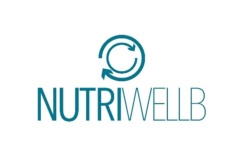
Topics:
Digital Safety | Media Literacy and Tackling Disinformation | Social Assistance and Welfare
Summary:
Objectives
This project with action approaches aimed at well-being, nutritional health and gender equality will address as a priority the denial of fake news in order to contribute to the digital scenario by teaching young people and teachers at the European HE level to read and write. The main objective of this project is to improve training and the development of an interactive platform with educational resources that allow contrasting information in an accessible way of implementation.
Activities
An integrative fact-checking platform and training activities will be offered:
-Platform development and implementation of materials
-Training Curriculum and Awareness Strategy Design
-Coordinate a detection and verification network of professionals and experts
-Awareness campaigns
Impact
-E-book and platform: they include the development and implementation of learning materials on Fact checking; health and wellness; and critical thinking.
-Training curriculum and awareness strategy design: it includes resume templates and training materials hosted on the Moodle platform
-Implementation of courses and activities with groups of students
-Implementation guide for Higher Education supported by a network of experts at European
Coordinator: UNIVERSIDAD COMPLUTENSE DE MADRID (Spain).
Consortium Partners: Fondazione Comunitaria di Agrigento e Trapani (Italy) | ACEEU GmbH (Germany) | Center for Knowledge Management (The Republic of North Macedonia) | UNIVERSIDADE NOVA DE LISBOA (Portugal) | UNIVERSIDAD DE ALCALÁ (Spain).
Project details:
Total approved budget: 250,000.00 EUR
UAH approved budget: 50,800.00 EUR
Key Action: Partnerships for cooperation and exchanges of practices
Action Type: Cooperation partnerships in higher education
Project Reference: 2022-1-ES01-KA220-HED-000089546
Erasmus Project Result: Search | Erasmus+ (europa.eu)
Project website: https://www.nutriwellb.com/
Start Date: 01-12-2022
End Date: 30-11-2024
Contact person at the UAH: Luis Fernández Sanz. (luis.fernandez.sanz@uah.es)
BEYOU : Boosting sustainability and social change through Youth led-community development
Topics:
An economy that works for people | Europe's social pillar | Supporting small business | Youth employment
Summary:
The project "BEYOU - Boosting sustainability and social change through Youth led-community development" targets local communities in Italy (Agrigento and Trapani), Greece (Athens), Spain (Alcalá de Henares), Cyprus (Nicosia) and Romania (Craiova) that are characterized by a high proportion of young people at risk of social exclusion and educational poverty. In line with the EU Youth Strategy 2019-2027, the European Green Deal and the EU Youth Goals, the project addresses the global needs of young people to be actively engaged in their local communities and to learn how to tackle by themselves the problems that most affect their lives and peers. Through an innovative socioeducational intervention addressed to young people, with particular focus on those in vulnerable situations (economic, social, cultural), the project includes the launch, testing and validation of a “Community Youth Incubator” programme, aiming at engaging actively both youth workers and young leaders into inclusive, green and sustainable development of their local communities. Disadvantaged young people will be engaged in grass root projects that address community issues that matter to them, take responsibility & contribute to the sustainable development & social innovation of the community in which they want to grow and live. Through the Community Youth Incubator programme, both youth workers and vulnerable and socio-economic disadvantaged youth will be engaged directly and gain their first experiences in leadership, community resources mobilization, project management, networking, providing also a meaningful voice to them in the framework of the Covid-19 recovery process in their local communities.
Coordinator: FONDAZIONE COMUNITARIA DI AGRIGENTO E TRAPANI (Italy).
Consortium Partners: ORGANOSI GI (Greece) | ASOCIATIA NATIONALA DE DEZVOLTARE CONTINUA A TINERETULUI DIN ROMANIA (Romania) | THE HUB NICOSIA LTD (Cyprus) | UNIVERSIDAD DE ALCALÁ (Spain).
Project details:
Total approved budget: 217,038.00 EUR
UAH approved budget: 43,381.00 EUR
Key Action: Key action 3 – Support to policy development and cooperation
Action Type: European Youth Together
Project Reference: 101089746
Erasmus Project Result:
Project website: https://www.beyou-project.eu/
Newsletter: Enero - Marzo - Nota de prensa - Octubre
Start Date: 01-12-2022
End Date: 30-11-2024
Contact person at the UAH: Luis Fernández Sanz. (luis.fernandez.sanz@uah.es)
DIÁLOGOS - COMMUNICATION IN PUBLIC SERVICE INTERPRETING AND TRANSLATING WITH LANGUAGES OF LESSER DIFFUSION
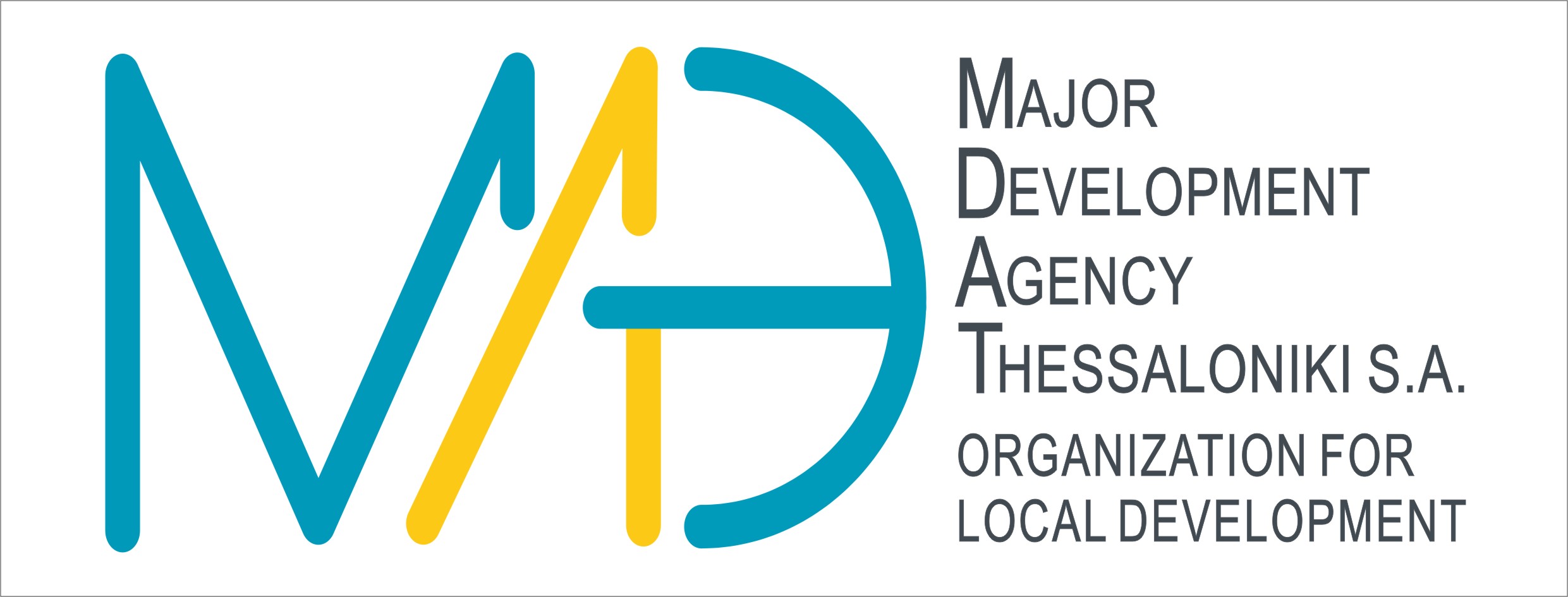
Topics:
Reception And Integration Of Refugees And Migrants | Development Of Training Courses | Bridging Intercultural, Intergenerational And Social Divide | Inclusion and diversity in all fields of education, training, youth and sport | Improving the availability of high quality learning opportunities for adults | Promoting inter-connected higher education systems.
Summary:
Public Services Interpreters and Translators (PSIT) hold a central role in addressing the communication needs of migrants when arriving in Europe. The context of their work is in constant change and calls for an up-to-date training with a comprehensive and interdisciplinary approach that includes legislation, ethics, communication, cultural awareness and emotional reflexivity. They are expected to have specific knowledge, skills and competences to deal with the current challenges and needs that come up in their everyday work and proficient language skills in their working languages.
PSIT, which includes legal, administrative, educational and health contexts, help societies deal with the challenges posed by migration by bridging the communication gap between administrations and newcomers who do not speak the host language. Although there are differences in education and training in PSIT in the partner countries, generally speaking, training programmes for PSIT usually include European languages, however, migrants’ languages such as Arabic, Chinese and even less Bambara, Wolof, Pastun, to name but a few, are hardly ever found. Yet, migrants arrive to Europe from Asia, Africa, etc. and do not necessarily speak English or French (both consistently used by organizations and public service providers when speaking to them) as what they need is PSIT in their own languages. NGOs, associations and administrations working with PSIT in LLD (Languages of Lesser Diffusion) normally turn to ad hoc PSIT who are members of the migrant community or who know their language but who are not trained to carry out this professional activity.
There are not many ways to achieve funding for social projects concerning migrants, especially connecting three Mediterranean countries which have similar migrant reception problems such as the lack of trained PSIT in LLD. This, however, is one of the main problems we face not only when there are migrant crises (which, unfortunately, are occurring with a higher frequency and intensity) but on a daily basis. Italy, Greece and Spain are in a constant migratory crisis and need to improve their first line of action: communication with incoming refugees and other citizens who do not speak their language.NGOs, associations and administrations working with PSIT in LLD normally turn to ad hoc PSIT who are members of the migrant community or who know their language but who are not trained to carry out this professional activity.
These ad hoc interpreters and translators are not trained in any way and there is an urgent and increasing demand for training not in their specific working languages but in intercultural communication, mediation, translation and interpreting.
Thus education and training are fundamental tools which, when applied to those who will later cater for bridging intercultural and inter linguistic gaps, could be a solution for communicating effectively in multilingual societies.
Coordinator: UNIVERSIDAD DE ALCALÁ (Spain).
Consortium Partners: ANAPTYXIAKI MEIZONOS ASTIKIS THESSALONIKIS AE - ANAPTYXIAKOS ORGANISMOS TOPIKIS AUTODIOIKISIS (Greece) | ARISTOTELIO PANEPISTIMIO THESSALONIKIS (Greece) | Associazione San MarcellinoOnlus (Italy) | Fundación Abrazando Ilusiones (Spain) | UNIVERSITA DEGLI STUDI DI GENOVA (Italy).
Project details:
Total requested budget: 250.000,00 EUR
UAH requested budget: 53.000,00 EUR
Key Action: Partnerships for cooperation and exchanges of practices
Action Type: Cooperation partnerships in higher education
Project Reference: 2022-1-ES01-KA220-HED-000086867
Erasmus Project Result: DIALOGOS Project Card
Project website: www.dialogoserasmus.eu
Start Date: 01-09-2022
End Date:31-08-2025
Contact person at the UAH:M. Carmen Pena Díaz (carmen.pena@uah.es)
ACES - Accounting for Circular Economy and Sustainability - Innovative training solutions in higher education facilitating accounting for the circular economy
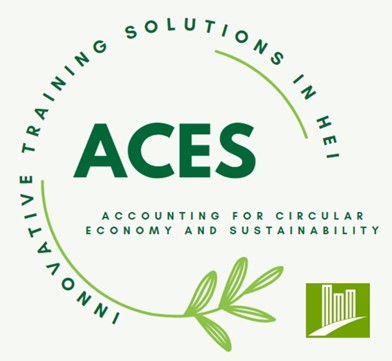
Topics:
Environment and fight against climate change| Stimulating innovative learning and teaching practices.
Summary:
Circular Economy (CE) regulation is pushing the appearance of circular business models. However, hardly any Higher Education Institutions (HEI) have included circular accounting training in their curriculum. Completion of the ACES project will enhance the knowledge and skills of business students, teachers, and practitioners about the current and future CE accounting practices and methods by developing teaching materials and innovative digital learning solutions in HEIs across the EU.
The ACES project activities start with a literature review on circular economy (CE) accounting and business interviews on measuring and valuing CE. Based on this research, modular teaching materials with innovative pedagogical elements are developed to fill the gap on circular accounting in current HEI curricula. These modules are piloted and validated for relevance and pedagogical suitability. Active dissemination will ensure wide-reaching use of the results among both HEIs and companies.
The ACES project brings together the latest knowledge and best business practices on financial and managerial accounting for Circular Economy (CE) in the context of the EU’s evolving regulatory landscape. The results include three learning modules and an innovative pedagogical teaching guide. The resulting framework of CE accounting is disseminated among business educators and company representatives, increasing understanding about the critical role of accounting to support the transition to CE.
Coordinator: HAAGA-HELIA AMMATTIKORKEAKOULU OY (Finland).
Consortium Partners: THE HAGUE UNIVERSITY OF APPLIED SCIENCES (Netherlands) | EUROPEAN UNIVERSITY CYPRUS (Cyprus). UNIVERSIDAD DE ALCALA (Spain) | IMPACT HUB GMBH (Austria).
Project details:
Total requested budget: 400.000,00 EUR
UAH requested budget: 68.176,00 EUR
Key Action: KA220-HED - Cooperation partnerships in higher education
Action Type: Cooperation among organisations and institutions
Project Reference: 2022-1-FI01-KA220-HED-000089835
Project website: https://www.erasmusaces.eu/
Start Date: 01-11-2022
End Date: 30-06-2025
Contact person at the UAH: Montes Pineda Óscar René (oscar.montes@uah.es)
COOP-GAME-EU - New methods and tools for EU Teaching and Learning at School
Topics:
EU integration| New skills and competences for teachers | School education | – digital skills | VET teachers,
Summary:
The progressive loss of effectiveness of traditional teaching methods in Spain is leading into an alarming level of educational failure. In this context, objective information about the major achievements and challenges of the European integration process is scarce in secondary schools. This situation leads to a detachment from the European Union (EU) affecting the youth and some sectors of civil society, which ultimately translates into disenchantment and scepticism among citizens about the EU and its policies.
The project aims at correcting this ongoing trend by designing and applying new teaching strategies and tools based on cooperative learning, gamification/serious games and Information and Communication Technologies (ICT).
The aim is to promote a better understanding, both in secondary education and vocational training, of the functioning of the EU and its institutions, addressing in a multicultural environment current concerns such as misinformation and fake-news.
The new teaching strategies and tools will be offered to those teachers and trainers interested in the academic and professional development of their students who have expressed the need to expand their skills on the EU.
In particular, three specific activities are planned:
1) Courses on the EU for teachers of secondary education and vocational training (PF) based on said methods and tools;
2) Workshops on the EU for secondary school students and PF pupils in which these methods and tools will be put into practice; and
3) Preparation of materials on the EU based on gamification, serious games and ICT.
In summary, the project aims to improve the study and knowledge of the EU using new resources and tools adapted to new learning methods and exportable throughout the EU. This will ultimately improve the academic curricula in the schools participating in the project.
Coordinator: Universidad de Alcalá (Spain).
Project details:
Total approved budget: 47 766.00 EUR
Jean Monnet Actions:
- Topic: ERASMUS-JMO-2022-OFET-TT
- Call: ERASMUS-JMO-2022-HEI-TCH-RSCH
- Project Number: 101085568
Erasmus Project Result: Not Yet Available
Project website: Not Yet Available
Start Date: 01-10-2022
End Date: 31-09-2025
Contact person at the UAH:
Carlos Jiménez Piernas. (carlos.jimenez@uah.es)
José Fernando Lozano Contreras (jfernando.lozano@uah.es)
DICE - Digital Community Engagement Accelerator for student learning and socio - economic impact
Proyecto reconocido como buena práctica por la agencia nacional eslovaca
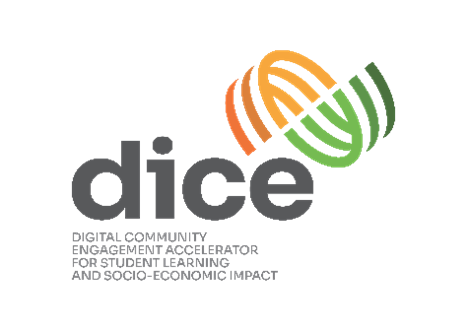
Topics:
Addressing digital transformation through development of digital readiness, resilience and capacity | Common values, civic engagement and participation | Stimulating innovative learning and teaching practices | Community development | Digital content, technologies and practices | Creating new, innovative or joint curricula or courses.
Summary:
The DICE Project will develop a scalable acceleration program to advance digital CE courses for university educators and programme directors to design and implement their own courses. The project will gather the latest knowledge, build the acceleration program, and pilot the accelerator. Creating a unique support tool, DICE will dissect the complex challenge of digitalising community engagement into smaller parts and translate it into enhanced student learning and social impact.
The consortium will RESEARCH how digital community engagement courses enhance student learning and social impact, and take it as a basis for DESIGNING (1) two Value Maps (student learning and social impact), (2) a CREATING a course design manual and (3) PROGRAMMING a web-based accelerator platform. Finally, by PILOTING, REVISING and DISSEMINATING the platform, we will ensure the project wide impact.
The DICE RESULTS are two Value Maps (WP2), a Manual for digital CE courses (WP3), a digital accelerator platform (WP4) a Handbook (WP4) and a Best Practices Report (WP5). They will ensure an evidence-based guidance for designing digital community engagement courses. Aiming to IMPACT student learning and universities’ social impact, the OUTCOMES are identifying value drivers, develop trustful and sustainable processes, and build capacities for community engagement and digitalization.
Coordinator: Technical University of Kosice (Slovakia).
Consortium Partners: HELIXCONNECT EUROPE S.R.L (Romania) | UNIVERSITA TELEMATICA DEGLI STUDI IUL (Italy) | Universidad De Alcalá (Spain) | ACEEU GmbH(Germany).
Project details:
Total grant amount:400.000.00 EUR
Total UAH grant amount: 71.275,00 EUR
Key Action 2:KA220-HED - Cooperation partnerships in higher education
Call: 2022
Project Reference: 2022-1-SK01-KA220-HED-000087668
NEWSLETTER:
Erasmus Project Result: DICE Project Card
Project website: https://www.diceaccelerator.eu/
Start Date: 01/11/2022
End Date: 31/10/2025
Contact person at the UAH: Luis Fernández Sanz (luis.fernandez.sanz@uah.es)
EU-PRILAW - European International Private Law in Action
Topics:
Law | EU integration | Promoting our European way of life | Upholding the rule of law | Judicial cooperation | European Private international Law.
Summary:
The objective of the Module is to provide basic tools that help understand and analyse the different aspects contained in European Private International Law. The Jean Monnet Module “European International Private Law in Action“ (EUPRILAW)
aims to offer a course on "European Private International Law", which will be taught progressively over the next three academic years (60 hours each) of Prof. Ana Fernández Pérez (2022/23, 2023/24 and 2024/25) and in which an innovative methodology will be used. In addition to the academic year itself, the Jean Monnet Module will organize three conferences (lectures and debates) with political leaders, researchers, members of civil society and schools, prepare and launch educational resources, publish (working papers, articles, books) and disseminate information. to the general public (press articles, blogs, radio and/or television interviews, etc.). The course will be taught by Postdoctoral and senior researchers from the Module team, as well as by international experts, who will also organize the different events.
During the scholarship period, the Module team will publish peer-reviewed articles and a collective book, participate in dissemination and information events in our country and throughout Europe, apply open educational resources and publish the summaries, contents, schedule and results of activities on different websites and blogs.
The Module will be based at the Faculty of Law of the UAH, where the Degree in Law is taught. In addition, the proposed Module aims to extend European studies to students from other degrees: Arts and Humanities, Health Sciences, Engineering and Architecture and Social Sciences, where there is currently no academic offer in such studies. In this way, the Module will promote greater knowledge about European studies and about the subject, in which Prof. Ana Fernández Pérez has a high qualification and experience.
Coordinator: Universidad de Alcalá (Spain).
Project details:
Total approved budget: 27 500.00 EUR
Jean Monnet Actions:
- Topic: ERASMUS-JMO-2022-MODULE
- Call: ERASMUS-JMO-2022-HEI-TCH-RSCH
- Project Number: 101081721
Erasmus Project Result: Not Yet Available
Project website: Not Yet Available
Start Date: 01-10-2022
End Date: 31-09-2025
Contact person at the UAH: Ana Fernández Pérez (a.fernandezperez@uah.es)
AI4PPP - Artificial Intelligence for People, Planet and Profit
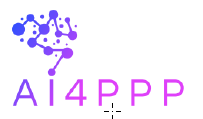
Keywords:
Addressing digital transformation through development of digital readiness, resilience and capacity | Stimulating innovative learning and teaching practices.
Summary:
The main objective of the project Artificial Intelligence for People, Planet, and Profit (AI4PPP) is to deliver an innovative, well-rounded, high value transferable educational and training programme in AI through: - comprehensive DACUM analysis - development of educational content based on DACUM analysis, -adaptation and creation of teaching contents and materials according to established needs of the target groups, - piloting the newly innovative developed modules and materials and its improvement based on piloting process, - implementation of AI-empowered scenarios in selected industries - preparation for certification validation based on micro-credentials concept AI4PPP is an interdisciplinary project designed to meet challenges of the modern education system and challenging market needs, by providing an awareness-raising, holistic and flexible education in business aspects of AI. We expect improved educational and training modules in AI together with guidelines, to be implemented and used by partner organizations and other relevant HEIs.
Importantly, they will broader international connections and links with other sectors necessary for any future actions and further development of project activities even after the project ends. In the long term, this project will increase their visibility and reputation on regional and European level and hence will gain major influence on policy processes in these sectors. Upon completion of the project, the results will finally reach partner’s personnel and students, both on the strategic decision-making level and practical level of everyday work of teaching and learning.
Foreseen Outcomes:
Partners will carry out a wide range of activities in order to implement a well-rounded, high value transferable educational and training programme in AI through:
- comprehensive DACUM analysis in order to proof trends and skills used and needed among relevant AI professionals;
- development of educational modules,
- adaptation and creation of teaching contents and materials according to established needs of the target groups,
- piloting the newly developed modules and materials,
- implementing scenarios of AI application in selected industries,
- and finally make all preparations for AI educational program to be certified using micro-credentials approach/concept.
Coordinator: ALGEBRA UNIVERSITY COLLEGE (Croatia).
Consortium Partners: FAKULTETA ZA UPORABNE DRUZBENE STUDIJE V NOVI GORICI ZAVOD (Slovenia) | UNIVERSIDAD DE ALCALÁ (Spain).
Project details:
EU Grant: 303.129,00 EUR
Key Action: KA220-HED - Cooperation partnerships in higher education
Action Type: Cooperation among organisations and institutions
Project Reference: 2021-1-HR01-KA220-HED-000029742
Erasmus Project Result Platform: AI4PPP Project Card
Project website: Not Yet Available
Start Date: 01-01-2022
End Date: 31-12-2024
Contact person at the UAH: M. Teresa del Val Núñez. (mteresa.val@uah.es)
SMACITE - Boosting the technical and non-technical skills and competences of smart cities technicians and engineers
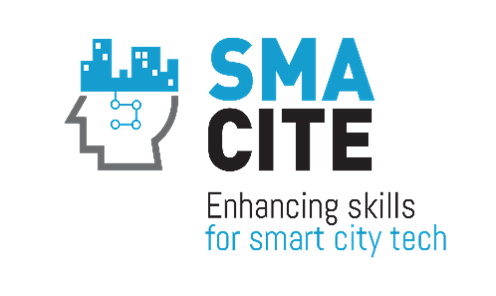
Topics:
Smart Cities | MOOCs | Virtual Worlds | Open Educational Resources | Online Learning | Competences Framework.
Summary:
The project aims to address the skills gap of Smart Cities technicians and engineers, by designing and testing a vocational education and training program that is based on a novel and multi-disciplinary curriculum combining digital skills on Smart Cities enabling technologies, with soft, entrepreneurship and green skills.
The expected project outputs are:
- A Smart Cities competences map and ESCO-compliant Smart Cities job profiles.
- A Smart Cities curriculum combining both technical and non-technical skills and competences and promoting personalized learning pathways.
- Learning resources for Smart Cities enabling technologies and for building the soft, entrepreneurship and green skills of Smart Cities technicians and Engineers.
- A diagnostic tool to identify personalized learning pathways.
- A MOOC for Smart Cities enabling technologies.
- Virtual Worlds for building the soft, green and entrepreneurship skills of Smart Cities technicians and engineers.
The main project beneficiaries are Smart Cities technician and engineers either from the public sector (i.e. municipalities) or enterprises providing Smart Cities solutions, as well as HEI and VET students interested in Smart Cities.
The curriculum will be tested through 4 national pilots in Greece, Bulgaria, Spain and Italy with at least 160 trainees.
The certification of the skills and competences will follow a two-fold approach: (a) using micro-credentials to recognize the knowledge and skills gained through the successful completion of each online training module at the MOOC and Virtual Worlds and (b) designing the “Smart Cities Specialization Certification” that will be awarded to those passing online certifications exams with e-proctoring after the completion of the training modules.
The project will create an ecosystem for the co-design and co-development of an innovative curriculum and technology-enhanced learning tools for the upskilling/reskilling of Smart Cities technicians and engineers.
Coordinator: Panepistimio Patron (Hellenic Republic).
Consortium Partners: Panepistimio Dytikis Attikis (Hellenic Republic) | N. Noulas Anonymi Etaireia (Hellenic Republic) | Universidad De Alcalá (Spain) | Olympiaki Epaideftiki Kai Symvouleftiki Epe (Hellenic Republic) | Fondatsiya Evropreyski Softueren Institut - Tsentar Iztochna Evropa (Bulgaria) | Apro Formazione Societa Consortilea Resonsabilita Limitata (Italy) | Politeknika Ikastegia Txorierri S.coop (Spain) | European Digital Sme Alliance (Belgium) | Sdruzenie Bulgarska Asociacia Na Softuernite Kompanii Bascom (Bulgaria) | Asociacion De Industrias De Conocimiento Y Tecnologia -Gaia-Euskalherriko Ezagutza Eta Teknologia Industrien Elkartea (Spain) | Comunidad de Madrid (Spain) |
Project details:
Total project budget: 1.675.545,00 EUR
Total grant amount: 1.340.436.00 EUR
Total UAH budget: 109,964.00 EUR
Total UAH grant amount: 87.971,00 EUR
Key Action 2: COOPERATION AMONG ORGANISATIONS AND INSTITUTIONS
Call: ERASMUS-EDU-2021-PI-ALL-INNO
Project Reference: 101052513
Erasmus Project Result: Not Yet Available
Project website: Home (smacite.eu)
Newsletter: Newsletter #1 - Newsletter #2 - Newsletter #3 - Newsletter #4- Newsletter #5- Newsletter #6
Start Date: 01/06/2022
End Date: 31/05/2025
Contact person at the UAH: Luis Fernández Sanz. (luis.fernandez.sanz@uah.es)
GreenCo - GREEN Computing App and Mooc for awareness-raising on digital pollution.

Topics:
Environment and fight against climate change | Addressing digital transformation through development of digital readiness, resilience and capacity | Inclusion and diversity in all fields of education, training, youth and sport.
Summary:
Specifically, the project seeks to achieve the following three fundamental objectives:
- Awareness-raising of digital pollution: In contrast to physical and visible pollution, on which much remains to be done but where we are making progress at an increasing pace, digital pollution is virtually invisible. It is not visible to the naked eye and, moreover, there are very few news items about it. One of the aims of the project is to raise awareness of the environmental impact of excessive data consumption and propose simple and accessible measures to reduce it.
- Self-assess knowledge about digital pollution: Closely related to the previous objective, once one is aware of the existence and impact of digital pollution, the following question can be raided: how much am I contributing right now? How badly am I doing? The project, essentially through the App, will provide a gamified self-assessment experience to encourage the participation of the younger audience.
- Online training of users for responsible use of technology: the next step up the ladder would be, after raising awareness of the problem and assessing it, the proposal of measures aimed at tackling it. To this purpose, the GreenCo project will develop a MOOC on digital pollution that provides young people with training in sustainable practices that can be incorporated into their daily habits.
The main expected result is an application which helps to increase the awareness on digital pollution in users between 15 to 29 years old. In that framework, the project will produce the following project results:
- An E-Book as an information compilation on green computing developed in four topics: Energy consumption, e-waste recycling, initiatives and legislation.
- A Mockup which contains the definition of app features based on background and objectives, and establish gamification processes.
- Green Computing App development. Its aim is a self-assessment of awareness on digital pollution, inform and give knowledge on it, and promote efficient energy consumption and e-waste recycling.
– Multilingual training Mooc, an online training on how to reduce digital pollution, for final users of the app – students from 15 to 29 years old, but also open to general public. In addition, communication activities adapted to the project's target audience are foreseen, such as the development of a website, social media campaigns, press impacts, multiplier events, etc.
Finally, project management activities are also foreseen, with the aim of complying with the programme rules and ensuring adequate internal communication.
Coordinator: COMUNIDAD DE MADRID (Spain).
Consortium Partners: FONDAZIONE ITS PER L'INFORMAZIONE E LA COMUNICAZIONE - INCOM (Italy) | GIP FIPAG (France) | FONDATSIYA EVROPREYSKI SOFTUEREN INSTITUT – TSENTAR IZTOCHNA EVROPA (Bulgaria) | UNIVERSIDAD DE ALCALÁ (Spain).
Project details:
Total EU Grant: 280.700, 00 EUR
UAH approved budget: 63.795,00 EUR
Key Action: KA220-VET - Cooperation partnerships in vocational education and training
Programme: Erasmus+ Key Action2: Cooperation among organisations and institutions
Project Reference: 2021-1-ES01-KA220-VET-000025159.
Erasmus Project Result: Not Yet Available
Project website: https://greenco-project.eu/
Courses Catalogue website:
Start Date: 01-02-2022
End Date: 01-12-2024
Contact person at the UAH: Luis Fernández Sanz. (luis.fernandez.sanz@uah.es)
VELA - VET Empowerment through innovative and inclusive Learning Approaches
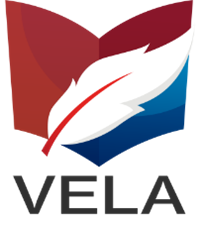
Topics:
Addressing digital transformation through development of digital readiness, resilience and capacity | Contributing to innovation in vocational education and training | Increasing attractiveness of VET.
Summary:
The shock of the COVID-19 crisis on education has been unprecedented. It has set the clock back on the attainment of international education goals, and disproportionately affected the most vulnerable. According with “UN - Policy Brief: Education during Covid-19 and beyond” more than 1.5 learners across the planet are or have been affected by lack of educational meaning due to the COVID-19 pandemic. However, vocational education and training (VET) systems are being uniquely impacted and it has received limited attention compared to other parts of the education system and is often seen as having lower status. While for mainstream schools, governments have adopted protocols to allow students to return to school, in the field of VET there is a dangerous carelessness. There is an enormous variety of tools available to teachers and trainers to create their own learning material and environments, but the vast majority of them are not VET-specific. Ready-made material with VET-specific content is much less developed. In most cases, the tools provided by public or private stakeholders focus exclusively on theoretical knowledge. There is a risk that VET learners are disadvantaged compared with learners from other educational tracks, as more efforts are put into general school subjects. This extraordinary situation is an opportunity for VET providers and learners alike to develop their digital competence.
Coordinator: I.E.R.F.O.P. ONLUS (Italy).
Consortium Partners: PCX COMPUTERS & INFORMATION SYSTEMS LTD (Cyprus) | ORANGE HILL Sp. z o.o. (Poland) | CENTRUL PENTRU PROMOVAREA INVATARII PERMANENTE TIMISOARA ASOCIATIA (Romania) | PRISM IMPRESA SOCIALE S.R.L. (Italy) | UNIVERSIDAD DE ALCALÁ (Spain).
Project details:
Total approved budget: 252.435,00 EUR
UAH approved budget: 40.875,00 EUR
Key Action: KA220-VET - Cooperation partnerships in vocational education and training
Action Type: Cooperation among organisations and institutions
Project Reference: 2021-1-IT01-KA220-VET-000032964
Erasmus Project Result: Not Yet Available
Project website: https://vela-project.eu/
Courses Catalogue website:
Start Date: 01-02-2022
End Date: 31-01-2024
Contact person at the UAH: Luis Fernández Sanz. (luis.fernandez.sanz@uah.es)
JOULE - Data JOUrnaLism courses for higher Education
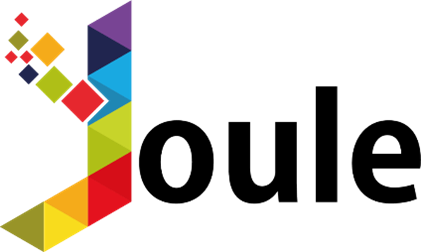
Topics:
Addressing digital transformation through development of digital readiness, resilience, and capacity | Contributing to innovation in vocational education and training | Increasing attractiveness of VET.
Summary:
Data journalism represents a rapidly growing experience in higher educational courses in the European countries and media are beginning to appreciate the use of data, in a systematic and scientific way, in the production of journalistic content. While telling stories with data has been part of the news practice since its earliest days, it is in the midst of a renaissance due to the data availability. Graphics desks, which used to be deemed as “the art department,” a subfield outside the work of newsrooms, are becoming a core part of newsrooms’ operation. Those people (they often have various titles: data journalists, news artists, graphic reporters, developers, etc.) who design news graphics are expected to be full-fledged journalists and work closely with reporters and editors. Indeed, data accessibility, analysis, visualization and reporting is an important skill to overcome the digital divide and to guarantee a well designed news spreading and to ensure modern democracy. The lack of data culture is clearly visible in these days of the coronavirus epidemic. The data provided in the news are often not the same in different newspapers. It is not clear which categories of people journalists are considering as coronavirus death, the epidemy flows are not clearly shown, lot of data are not clearly given (e.g., the percentage of people going in intensive care, the distribution of death per age). The result is that people are not sure of what is happening and trust in news diminishes. The most decisive factor in the emergence of data Journalism is undoubtedly the availability of an incredible amount of material to be searched, selected, processed, analysed, compared and finally published in a journalistic form. This process requires special tools and programs, as well as the technical mathematical skills to use them, and a new approach to the understanding of news and to their narrative. Data journalism attempts to combine a technical approach to data based on finding “answers to questions" and the search of patterns and anomalies with the journalistic approach to research "interesting questions". The main purpose of data journalism is to combine mathematical techniques and computational resources with experience and journalistic flair to obtain original investigative journalism. Data Journalism represents for journalists the ability to tell otherwise untold stories and to increase confidence in published news; indeed, nowadays the most important news media have their own data newsroom. The use of data analysis and data visualization for communication is not limited to journalism in the strict sense, but it concerns the communication in general of both enterprises and institutions promoting transparency and accountability in their relationship with citizens. At European level, the training of data journalists is not uniformly widespread and formalized, rather it is entrusted either to generic data science and data visualization courses, or to generic journalism courses, with digital communication content, while only few HEs provide courses in data journalism. JOULE attempts to meet four specific NEEDS: -The training gap: between the training of traditional journalists and the skills needed in the digital context. -The academic gap: a lot of degree courses in data science, none in data journalism; - The standardization gap: there is no well-defined academic curriculum on data journalism especially in the south of Europe. -The illiteracy gap: citizens don't have a clue about how data can misinform them: There is no citizen's awareness training about algorithmic manipulation.
Coordinator: UNIVERSITA DEGLI STUDI DELLA TUSCIA (Italy).
Consortium Partners: UNIVERSIDADE NOVA DE LISBOA (Portugal) | DATANINJA SOCIETA A RESPONSABILITA LIMITATA SEMPLIFICATA (Italy) | Evodevo s.r.l. (Italy) | ARISTOTELIO PANEPISTIMIO THESSALONIKIS (Greece) | UNIVERSIDAD DE ALCALÁ (Spain) | UC LIMBURG (Belgium).
Project details:
Total approved budget: 316.884,00 EUR
UAH approved budget: 39.903,00 EUR
Key Action: KA220-HED - Cooperation partnerships in higher education
Action Type:Cooperation among organisations and institutions
Project Reference: 2021-1-IT02-KA220-HED-000030349
Erasmus Project Result: Not Yet Available
Project website: https://www.jouleproject.eu/
Courses Catalogue website:
Start Date: 01-12-2021
End Date: 30-11-2023
Contact person at the UAH: Luis Fernández Sanz (luis.fernandez.sanz@uah.es)
DECEL - Digital Electronics Collaborative Enhanced Learning
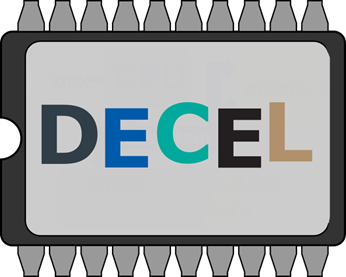
Topics:
Addressing digital transformation through development of digital readiness, resilience, and capacity | Developing STEM/STEAM in higher education, in particular women participation in STEM | Stimulating innovative learning and teaching practices
Summary:
DECEL project bursts as an initiative of a group of teachers from the Engineering disciplines, at a time when the European Commission has presented two major initiatives aimed at unlocking Europe´s potential on education and innovation: the Communication on the European Education Area, and the introduction of the updated Digital Education Action Plan, whose purpose is to support the use of technology in education and the development of digital competences. Paradoxically enough, although engineering courses probably use the most sophisticated software tools to program, design or simulate, teaching processes in this field are still based upon traditional learning methodologies, with limited or no bilateral interaction promoted in most of them, and where the role of the teacher remains that of a mere lecturer in front of a passive cohort of students. In other words, while this increasing technological sophistication is being used in our classrooms to calculate things the teaching activity has proved to be hermetic to the use of this young and fresh tools to dynamize the learning process. Moreover, and equally disturbing, despite the global expanding tendency of this sort of studies, and the common use of the English language as a learning vehicle, the Erasmus+ Impact Study (2019) clearly evinces a deficit in the participation of Engineering students in international mobility programmes. This might be the result, among other circumstances, of the high level of experimentally into the Engineering fields all the technical courses, which are the most important part in the syllabus, and the handicap that may pose access to expensive lab equipment at any time and from anyplace. Against this situation, our project seeks a crucial movement from a reactive to a pro-active strategic approach in the design of Digital Electronic Systems courses; a movement that shall depart from the added value of using technology in our curricula to mainstreaming a digitally enhanced learning and teaching; a movement, to say the least, that shall stop having a traditional focus on internationalization based on mobility as part of our home degrees, to understand that we should explore internationalization of the curriculum and the teaching and learning process as the beacon for innovation in this studies. From the university level, new Erasmus+ Calls such as Alliance of European Universities are promoting the construction of joined schemes between several universities. These ones are usually constructed under a high-level perspective using a bottom-up approach. However, the teachers involved in regular activities as teaching have not had the chance to promote some type of European collaboration. Joining the need of promoting internationalization in our students, apply new pedagogical tools in curricular courses, extending European teaching cooperation and take advantage of new software/hardware resources, DECEL project is proposed.
Coordinator: Universidad de Alcalá (Spain).
Consortium Partners: UNIVERSIDADE DO PORTO (Portugal) | UNIVERSITA DEGLI STUDI DI FERRARA (Italy) | UNIVERSITE DE TOURS (France).
Project details:
Total approved budget: 277.505,00 EUR
UAH approved budget: 70.149,00 EUR
Key Action:KA220-HED - Cooperation partnerships in higher education
Action Type: Cooperation among organisations and institutions
Project Reference: 2021-1-ES01-KA220-HED-000032189
Erasmus Project Result: Search | Erasmus+ (europa.eu)
Project website: DECEL – Digital Electronics Collaborative Enhanced Learning (univ-tours.fr)
Start Date: 25-02-2022
End Date: 25-02-2025
Contact person at the UAH: Ignacio Bravo Muñóz. (ignacio.bravo@uah.es)
e-CLOSE - A model for Interactive (A)Synchronous Learning in Online STEM Education

Open and distance learning | New innovative curricula/educational methods/development of training courses | ICT | new technologies | digital competences
Description
The COVID-19 outbreak has had a significant impact on higher education all over the world. Universities had to rapidly transform their study programmes to be delivered online to keep student retention and maintain access to learning. The adjustment however comes with significant challenges not only in relation to the technical aspects of handling several hundred online lectures simultaneously but also to the methodology of the teaching process and the teacher-student interaction. The technological development and wide availability of basic ICT tools make the shift to online education relatively easy. The real challenge of today however is to consciously choose available collaboration tools and engagement methods to arouse student interest and provoke a response for a more efficient and effective communication and learning experience while away from a traditional classroom. To face that challenge, the universities involved in the project – Lodz University of technology (Poland), University of Applied Sciences in Saarbrücken (Germany), University of Alcalá (Spain) and University of Aveiro (Portugal) – decided to join forces for the development, implementation and dissemination of innovative and comprehensive teaching and learning solutions, supported by advanced IT technologies and tools, to increase the level of student-teacher interaction during online education:
- Methodology of Interactive Asynchronous and Synchronous Online STEM Education
- Distance Teaching Toolbox for Educators
- Teacher Training Courses
- Smart Gamification Based On Multiple Intelligence Theory
- Online Badges For Sustainable Education (21st Century Skills )
- Guidelines and Recommendations
To further benefit the project participants, the consortium will offer a series of training opportunities for academic teachers tailored to their individual needs to increase their competences for effective online teaching arousing student interest and responsiveness. The students will get a chance to meet in several of the partner countries to conduct a gamification learning experience in the blended formula and to develop the 21st century skills sought by the labour market.
The project is directed towards students and academics of the consortium universities and beyond ready to bring the ICT technology to the forefront when facing the challenges of online education.
Coordinator: POLITECHNIKA LODZKA (Poland)
Partners: UNIVERSIDAD DE ALCALÁ (Spain) | UNIVERSIDADE DE AVEIRO (Portugal) | HOCHSCHULE FUR TECHNIK UND WIRTSCHAFT DES SAARLANDES (Germany)
Key Action: Cooperation for innovation and the exchange of good practices
Action Type: Partnerships for Digital Education Readiness
Start Date: 01/03/2021
End Date: 28/02/2023
Erasmus+ project card: https://ec.europa.eu/programmes/erasmus-plus/projects/eplus-project-details/#project/2020-1-PL01-KA226-HE-096239
Website: https://eclose.eu (https://eclose.p.lodz.pl)
Contact person at the UAH: Elisa Rojas Sánchez
SGC - SME Cluster Growth

SME cluster growth training | student business consulting | a launch of cross-border facility sharing schemes
Summary:
The SME Cluster Growth project aims at empowering SMEs in the engineering sector to ensure their maturation and stable growth by equipping them with horizontal skills and knowledge. This will be achieved via a collaborative effort of higher education institutions (HEIs), future skills and business growth professionals and university-industry relationship experts that will respectively contribute to the advancement of SMEs’ operational, attitudinal and adaptive capacities. The project will do this via (i) SME cluster growth training (ii) student business consulting, and (iii) a launch of cross-border facility sharing schemes. More particularly, the consortium will:1. Identify cluster growth needs of SMEs in 6 project regions and 65 (6x10 + 1x5) good practices on successful SME growth strategies (Mapping);2. Develop and implement SME growth mobility and training programmes for a group of 60 (6x10) SMEs including workshops, peer learning and cross-border hot desk schemes (Learning); 3. Launch cross-border network support structures in science parks and business organisations in the form of hot desks, university access points, and facility sharing for SMEs to explore growth opportunities (Facility sharing);4. Match 24+ (6x4) MA & PhD students with SMEs to conduct in-house research and 24 (6x4) BA students to take up business challenge projects in the areas facilitating cluster growth (Consultancy & practice-based learning);5. Develop and pilot test the ‘Change of Perspective Programme’ where 6+ academics and 6+ business professionals exchange their workplaces for a day to experience a different environment (Learning);6. Build 6 cluster growth networks through forming stakeholder councils and community and capacity building events in the partner regions and linking the project cluster SMEs to the European Cluster Collaboration Platform (ECCP) for visibility, network and future collaboration opportunities (Growth).
Coordinator: Universidad de Málaga
Consortium Partners: Institut Mines Telecom Business School, Crazy Town Oy, University Industry Innovation Network, University of Bologna, Istambul Technical University, Momentun Consulting and Cork Institute of Technology.
Key Action: Cooperation for innovation and the exchange of good practices
Action Type: Knowledge Alliances for higher education
Project Reference: 621648-EPP-1-2020-1-ES-EPPKA2-KA
Erasmus Project Result: https://ec.europa.eu/programmes/erasmus-plus/projects/eplus-project-details/#project/621648-EPP-1-2020-1-ES-EPPKA2-KA
Project website: https://smeclustergrowth.eu/
Start Date: 01/01/2021
End Date: 31/12/2023
Contact person at the UAH: Salvador Sánchez Alonso (salvador.sanchez@uah.es), Elena García (elena.garciab@uah.es)
COMET2 – A Community of Ethics Teachers in Europe 2

Educación en Valores | Enseñanza Filosófica y Moral | Debates y Dilemas Morales | Estudio Comparativo de Pedagogía Ética | Metaética | Sistemas y Legislaciones Educativas Europeas Comparadas
Description.
Ethics education plays an integral role in the fostering of European values. However, Ethics is studied in European secondary schools within a wide variety of curricula, ranging from Philosophy (such as in The Netherlands and Slovenia) and Civics (such as in Slovakia), to Ethics as an independent curriculum (such as in Germany). This fragmentation of curricula, along with a fragmentation of pedagogical methods and goals, inhibits the opportunities for exchanges of best practices and mutual learning. The Community of Ethics Teachers in Europe aims at overcoming these curricular differences through (digital) innovation, in order to promote the acquisition of skills and competences of European ethics teachers.
The Erasmus+ project from 2017 with the title 'A Community of Ethics Teachers in Europe' (COMET; 2017-1-NL01-KA201-035219) established a network of ethics teachers by means of an online platform. With the current project, 'A Community of Ethics Teachers in Europe 2' (COMET 2), we are expanding the online platform with the Ethics curricula of five new partner countries: Bulgaria, Greece, Luxembourg, Norway and Spain.
Coinciding with the development of the online platform, the research of the 2017 COMET project aimed at mapping and categorising the Ethics curricula of the participating countries. One of the remarkable findings of the COMET project was that none of the participating countries employed a comprehensive methodology towards oracy in the ethics classroom: even though classroom discussions on ethical topics were common, a more systematic approach to debating moral dilemmas remained absent. This is noteworthy, as many studies have shown the positive impact of debate on the development of skills that are at the core of every ethics curriculum, such as critical thinking, empathy and respect for different viewpoints.
In order to respond to this lacuna in European Ethics Education, the COMET 2 project will aim at the development of a teacher's guide with the provisional title: 'Teaching Ethics through Debate'. The teacher's guide will consist of a systematic approach to debating moral dilemmas, supplemented with a collection of moral dilemmas that can be used as a starting point for classroom debates.
Partners:
Tilburg University (Netherlands) | Wolfert Bilingual School (Rotterdam, Netherlands) | ZiP (National Debate Organisation of Slovenia) | International School Bežigrad (Slovenia) | Matej Bel University (Banská Bystrica, Slovakia) | Centre for the Study of Professions (Norway, Oslo) | Oslo Metropolitan University (Oslo, Norway) | University of Oslo (Oslo, Norway) | Universidad de Alcalá de Henares (UAH – Madrid, Spain) | University of Osijek (Croatia) | Sofia University (Sofia, Bulgaria) | Gymnasium Weilheim (Bavaria, Germany) | Bavarian Ministry of Education (Germany) | National and Kapodistrian University (Athens, Greece)
Datos del programa y ref. proyecto:
Código del Proyecto: KA201-6F56D9A8
Página web: https://ethics.community/
Fecha de Inicio: 01/09/2020
Fecha de Fin: 31/08/2024
Persona de contacto en la UAH: Ricardo Gutiérrez Aguilar.
Trust AI - Trustworthy AI
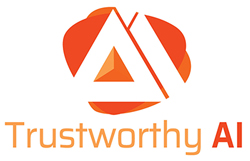
Inteligencia artificial | Educación superior | Enseñanza y aprendizaje de la AI en otras áreas.
La inteligencia artificial (IA) es un área de importancia estratégica para el desarrollo tanto social como económico de la Unión Europea y un elemento clave de la Agenda Digital para Europa. No obstante, al mismo tiempo que los sistemas basados en IA ofrecen oportunidades inmensas, crean riesgos que pueden comprometer nuestros principios democráticos o éticos en áreas como la voluntad humana, la inclusión (o su inversa, la discriminación), privacidad y transparencia, entre otros.
La educación superior debe jugar un papel importante contribuyendo a una IA innovadora, segura y ética. Está en nuestras manos no tan solo preparar en este aspecto a los jóvenes con habilidades avanzadas de programación, sino también al resto de estudiantes para que entiendan las implicaciones de la IA y asegurar que se usa en beneficio de la humanidad.
La educación superior debe jugar un papel importante contribuyendo a una IA innovadora, segura y ética. Está en nuestras manos no tan solo preparar en este aspecto a los jóvenes con habilidades avanzadas de programación, sino también al resto de estudiantes para que entiendan las implicaciones de la IA y asegurar que se usa en beneficio de la humanidad.
El objetivo principal de Trust AI, por lo tanto, es ayudar a las universidades y demás IES para mejorar radicalmente su enseñanza en el ámbito de la IA para enfatizar los componentes que se basan en valores y ética, y alcanzar a estudiantes de todas las disciplinas, especialmente aquellas relacionadas con los negocios, las políticas públicas y las ciencias sociales, que también juegan un papel importante en la expansión de la IA en la sociedad.
Foreseen outcomes:
- Conseguiremos esto introduciendo tres recursos que serán usados en las IES para introducir nuevos aprendizajes en este campo.
- El MARCO DE APRENDIZAJE para la enseñanza de la Inteligencia Artificial en la Educación Superior, que definirá las competencias y habilidades relacionadas con una IA confiable y segura, y las estrategias de aprendizaje a seguir para desarrollar dichas competencias en los estudiantes.
- Los RECURSOS EDUCATIVOS ABIERTOS para la Inteligencia Artificial Confiable (Trustworthy AI), que empoderarán a los profesores para poder incluir este tema en su docencia. Los REA incluirán una guía para el profesor, actividades sugeridas y material multimedia que podrá ser usado directamente con los estudiantes como actividades interactivas.
- La GUÍA PARA LA REALIZACIÓN DE HACKATONES de Inteligencia Artificial Ética que guiará a los docentes en cómo usar esta innovadora metodología para ayudar a consolidar las habilidades de los estudiantes basándose en casos de negocio y problemas sociales de la vida real.
Durante el proyecto, al menos 40 líderes de la educación superior, 80 docentes y 200 estudiantes se involucrarán en el desarrollo, las pruebas y la implementación del proyecto. Como resultado de nuestro trabajo:
- Docentes de diversas disciplinas serán capaces de incorporar habilidades avanzadas en lo digital y lo cívico-social en sus respectivas asignaturas o cursos, centrándose en el pensamiento crítico y los aspectos relacionados con la resolución de problemas.
- Los estudiantes obtendrán habilidades más adecuadas para el mercado laboral y contribuirán a un desarrollo social sostenible. Entenderán cómo poder aprovechar la IA sin comprometer los valores o la confianza que son fundamentales en el desarrollo y la democracia.
Coordinador: Universidad de Alcalá.
Partners:
UMEA UNIVERSITET (UMU) - Suecia. | NATIONAL UNIVERSITY OF IRELAND MAYNOOTH (NUIM) – Irlanda | Stichting ALLAI Nederland (ALLAI) – Países Bajos. | UNIVERSITY INDUSTRY INNOVATION NETWORK (UIIN) - Países Bajos. | European E-Learning Institute (EUEI) – Dinamarca | MOMENTUM MARKETING SERVICES LIMITED - Irlanda.
Project details:
Key Action: Cooperation for innovation and the exchange of good practices
Action Type: Strategic Partnerships for higher education
Project Reference: 2020-1-ES01-KA203-082983
Erasmus Project Result: Erasmus+ project card | Erasmus+ (europa.eu)
Project website: Home - TRUSTWORTHY AI (trustworthyaiproject.eu)
Start Date: 01-09-2020
End Date: 31-08-2022
Contact person at the UAH: Marçal Mora-Cantallops. marcal.mora@uah.es
EcoHeritage - Ecomuseums as a collaborative approach to recognition, management and protection of cultural and natural heritage.
Social education, civic participation, ecomuseums, community museums, adult education, heritage.
Recent demographic decline affects unevenly different population settlements across Europe: rural areas face high rates of depopulation, while urban areas experience higher population concentrations. Spain leads rural depopulation in Europe, with only a 25.7% of its population living in rural areas (Eurostat: 2017). The high rate of depopulation in rural areas also poses an important social challenge due to the related high risk of exclusion and poverty.
- In 2015, 25.5% of the rural population was at risk of poverty or social exclusion, while in cities it was 24%. The risk of social exclusion in rural areas affect the 27.1% of the population, while in the cities, the 24.3% (Eurostat: 2017).
- People living in rural areas tend to drop out of education and training earlier. In fact, according to Eurostat, the rate of young people aged 18-24 living in rural areas of the EU who neither study nor work is 3.7 points higher than people living in cities of the same age group.
- Given the cultural and natural richness of rural areas, heritage can definitely represent an alternative source of development for these territories. Ecomuseums work as shared processes of recognition, management and protection of cultural and natural heritage, aimed at promoting sustainable development. Ecomuseums are organised by its communities in an associated and cooperative way based on four main areas: economic, social, environmental and scientific-technological. Ecomuseums are able to generate incomes from culture, knowledge and services. EcoHeritage primary target group are rural communities, especially adult population, as well as ecomuseums in Europe.
The secondary target group addressed are municipalities and local governments, cultural institutions, heritage research institutions and adult education providers.
- Cooperation for innovation and the exchange of good practices.
- Strategic Partnerships for adult education Form.
Foreseen outcomes:
- The specific objectives of our project are:
- To raise awareness about ecomuseums as a collaborative heritage management model, establishing a set of criteria for its recognition and a common methodology to improve its contribution to social, economic, environmental and heritage sustainability of rural area.
- To provide skills to adult learners in rural areas through the creation of innovative training materials on active citizenship promotion and participatory heritage management.
- To generate steady communication networks between ecomuseums at national and European level thus fostering knowledge and good practices exchange that will contribute to the sustainability of consolidated and new coming ecomuseums.- To foster the creation of ecomuseums as an endogenous resource for competitiveness and social, economic and environmental sustainability of rural areas.
Coordinator: Universidad de Jaén
Partners:
Universidad de Alcalá | On Projects Advising | International Movement for a New Museology | COFAC COOPERATIVA DE FORMACAO E ANIMACAO CULTURAL CRL | UNIVERSITA' DEGLI STUDI DI MILANO-BICOCCA | Comune di Parabiago | Fundacja Miejsc i Ludzi Aktywnyc
Datos del programa y ref. proyecto:
Project Code: 2020-1-ES01-KA204-082769
Start Date: 01/12/2020
End Date: 31/05/2023
Contact person at the UAH: Óscar Navajas Corral. oscar.navajas@uah.es
BEGIN - Blockhain Enabling Growth in New Enterprises.
Blockchain training |entrepreneurship education | digital skills | SME/start-up business models
SMEs are the backbone of our economies: they make up 99% of businesses in the UK, Ireland and across Europe and create 85% of new jobs. Yet the business environment is changing rapidly, not least due to developments in digital technology. If the EU is to meet its “Start-up and scale-up” initiative to help more businesses grow faster, more work must be done to teach business managers and entrepreneurs they skills they need to adapt to the digital global economy.BEGIN will respond by creating and mainstreaming a new blockchain training model that enables entrepreneurship education providers to teach blockchain technology to their SME and entrepreneur learners. We start from the assumption that blockchain technologies and the infrastructure surrounding it has matured sufficiently so that the digital skills and investment required to integrate blockchain technologies into SME/start-up business models are now accessible. However, new training must not be solely technical: it must address the attitudinal, knowledge and skills barriers that SMEs – and the wider entrepreneurship VET sector – faces.
Foreseen outcomes:
- Entrepreneurship educators working in business centres, colleges, incubators and accelerators will increase their own knowledge regarding blockchain and Digital Ledger Technologies, and develop their own skills for teaching it. This includes an improved mastery of a new approach to vocational skills development -problem-based learning Cooperation for innovation and the exchange of good practices.
- Abilities to teach EntreComp and DigComp related competences.
- Managers of SMEs and start up entrepreneurs will develop the entrepreneurial and digital skills to identify, evaluate and integrate blockchain technologies to boost their business growth. These skills will enable them to participate more fully in the digital economy and contribute to business growth.
- Managers and leaders of organisations that provide entrepreneurship VET, including enterprise development agencies, business centres, and colleges, will benefit from an improved awareness regarding the importance of blockchain skills as relevant and valuable to entrepreneurship curricula. Furthermore, thanks to the availability of resources and the online course, they will be able to accelerate the introduction of blockchain training and increase the quality of this training by blending digital and traditional teaching strategies.
Coordinator: NATIONAL ENTERPRISE NETWORK (NEN)
Partners:
UNIVERSITY OF ALCALA (UAH) |UNIVERSITY INDUSTRY INNOVATION NETWORK (UIIN) | EUROPEAN E-LEARNING INSTITUTE (EUEI) | MOMENTUM
INNOVATIONS
Datos del programa y ref. proyecto:
Project Code: KA202-9980B432
Start Date: 01-09-2020
End Date: 31-08-2022
Contact person at the UAH: Miguel-Angel Sicilia Urban. msicilia@uah.es
SETTLE - Population imbalances in Europe: challenges of urban concentration versus rural depopulation
Development of accessible open educational resources | Technological accessibility in HEIs | Training of students for job place entry

This project studies population imbalances in Europe, their challenges and opportunities, by contrasting two different territorial subjects: rural areas suffering from depopulation versus growing urbanization areas with a high concentration of population
Foreseen outcomes:
The objectives of this analysis are: to describe the settlement paths of population in Europe and their growth dynamics; to detect through economic and social models the factors conditioning these dynamics; to know the socioeconomic challenges in terms of services and infrastructure as well as the opportunities for a better cohesion between these two territorial realities; and to describe relations between rural areas and cities.
Partners:
---
Datos del programa y ref. proyecto:
Jean Monnet Activiy - SETTLE
Project Code: 620414-EPP-1-2020-1-ES-EPPJMO-PROJECT
Start Date: 01/09/2020
End Date: 31/08/2021
Contact person at the UAH: Ruben Garrido Yserte (ruben.garrido@uah.es)
UniSTAR - UNIversity STAff for Refugees
Inclusive education | disadvantaged learners | refugee students | Integration | staff training model
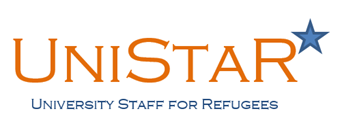
Summary:
The main objective of UniSTAR Project is to Promote inclusive education, training and fostering the education of disadvantaged learners through supporting teachers, educators and leaders of educational institutions in dealing with diversity, related to refugee students.
The Project addresses three topics: Integration of refugees, equity and Migrants' issues.
The project falls under the European Pillar of social rights. It aims to build a “more inclusive and fair European Union” and is in line with the 2015 Paris Declaration.
Foreseen outcomes:
- An online toolkit for university staff (which is based on the best practice developed by the UNHCR for primary and secondary school teachers)
- A staff training model that would be adaptable in any higher education institution in the EU (which is innovative and not necessarily based on an existing model)
Coordinator: Vrije Universiteit Brussel (Belgium)
Consortium Partners: Alice Salomon Hochschule Berlin (Germany) │ Vilniaus Universitetas (Lithuania) │ European University Foundation-Campus Europae (Luxembourg) │ Stichting Hogeschool Utrecht (Netherlands) │ United Nations High Commissioner for Refugees (Switzerland)
Project details:
Total EU-GRANT: 147.753,00 EUR
UAH approved budget: 17.259,00 EUR
Key Action: KA203-HED – Strategic Partnership
Action Type: Cooperation for innovation and the exchange of good practices
Project Reference: 2019-1-BE02-KA203-060347
Erasmus Project Result: https://erasmus-plus.ec.europa.eu/projects/search/details/2019-1-BE02-KA203-060347
Project website: Catalog - UNISTAR, University Staff for Refugees (eurekos.com)
Start Date: 01-10-2019
End Date: 30-04-2022
Contact person at the UAH: Luis F. Rivera Galicia (luisf.rivera@uah.es)
EduTech − Asistencia tecnológica a la accesibilidad en la Educación Superior Virtual
Development of accessible open educational resources | Technological accessibility in HEIs | Training of students for job placement entry

The Project aims to promote equity and the inclusion of people with disabilities in Higher Education Institutions (HEIs) and the improvement of their labor insertion, through the construction of management skills by establishing a Technological Accessibility Unit. This project also aims to implement avant-garde accessible technology supported by an adequate methodological structure, so that the coverage of several of the generic priorities will be described in a set of guides.
Foreseen outcomes:
- Six guides will be created to help solve the main problems of accessibility in higher education:
- (G1) Guide for the implementation of technology accessibility management units in HEIs.
- (G2) Accessible and adaptive virtual campus technical guide for the implementation of e-learning.
- (G3) Technical guide for the creation and management of learning resources, open learning resources (OERs) and accessible MOOCs.
- (G4) Guide for self-assessment of accessible virtual quality.
- (G5) Accessibility training guide for personnel involved in the teaching-learning process.
- (G6) Practical guide for the development of virtual courses in the development of skills for people with disabilities: an approach from labor inclusion.
- The development of accessible open educational resources (OER), accessibility support tools for teachers and students, accessible open courses, contemplating the universal design for learning.
- To create a cooperation network to allow the exchange of good practices and success stories in research.
- To impact on the educational and occupational insertion of students with disabilities by providing them with adequate training, involving the appropriation of knowledge and social coexistence.
Partners: Universidad Politécnica Salesiana (Ecuador) │ Universidad del Azuay (Ecuador) │ Universidad Veracruzana (Ecuador) │ Tecnológico Nacional de Mexico (México) │ Østfold University College (Norway) │ Universidad de Alicante (Spain) │ Universidade Aberta (Portugal)
Programme: Erasmus+ KA2, Cooperation for innovation and the exchange of good practices, Capacity Building in Higher Education
Project Code: 609785-EPP-1-2019-1-ES-EPPKA2-CBHE-JP
Star Date: 15/11/2019End Date: 14/11/2022
Contact person at the UAH: Salvador Otón Tortosa
ERASMUSJOBS-Bridging the skills gap of the Erasmus Generation
Tackling skills gaps and mismatches | Transparency and recognition of skills and qualifications | Promoting internationalization
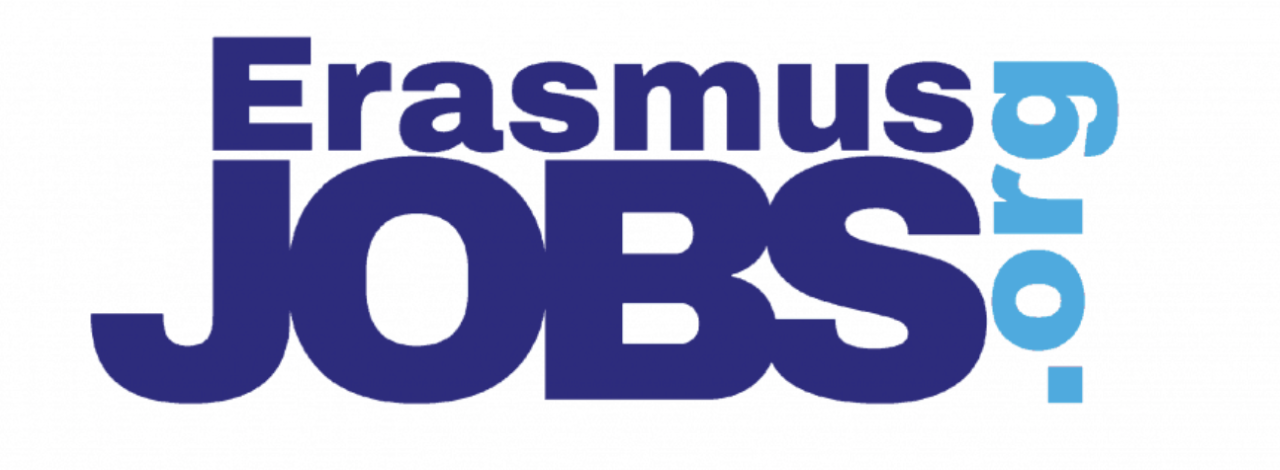
The Project Bridging the skills gap of the Erasmus Generation (Erasmusjobs) pursues to identify the skills obtained by the students, who have a mobility experience, and translate them to the CV and labor market. This platform would specifically target Erasmus+ alumni and will place emphasis on mobility experience, languages, volunteering and the informal non-formal learning as well as the mobility experience as such.
Foreseen outcomes:
- To create a job platform for involved stakeholders to advertise, recognize and recruit for specific transversal key competences and for Erasmus+ Alumni to better advertise skills gained through a mobility experience, volunteering, or other non-formal learning.
- A metric to track the success of the students to allow the universities and policy makers to implement changes for future students.
- To implement a training toolkit for the various stakeholders involved which will contain methodologies and training outlines for participants.
Coordinator: Erasmus Student Network AISBL (Belgium)
Partners: Masarykova univerzita (Czech Republic) │LEO-NET (Netherlands)│ European Institute for Industrial Leadership (Belgium)│ Universite de Mons (Belgium)│European University Foundation-Campus Europae (Luxembourg) │Universita DEgli Studi Di Roma Tor Vergata (Italy) │Expertise in Labour Mobility B.V. (Netherlands)
Strategic Partnership, Key Action 2
Start Date: 01/11/2019
End Date: 01/11/2021
Contact person at the UAH: Alfredo Gardel
ERUM- Enhancing Research Understanding through Media
Quality of information
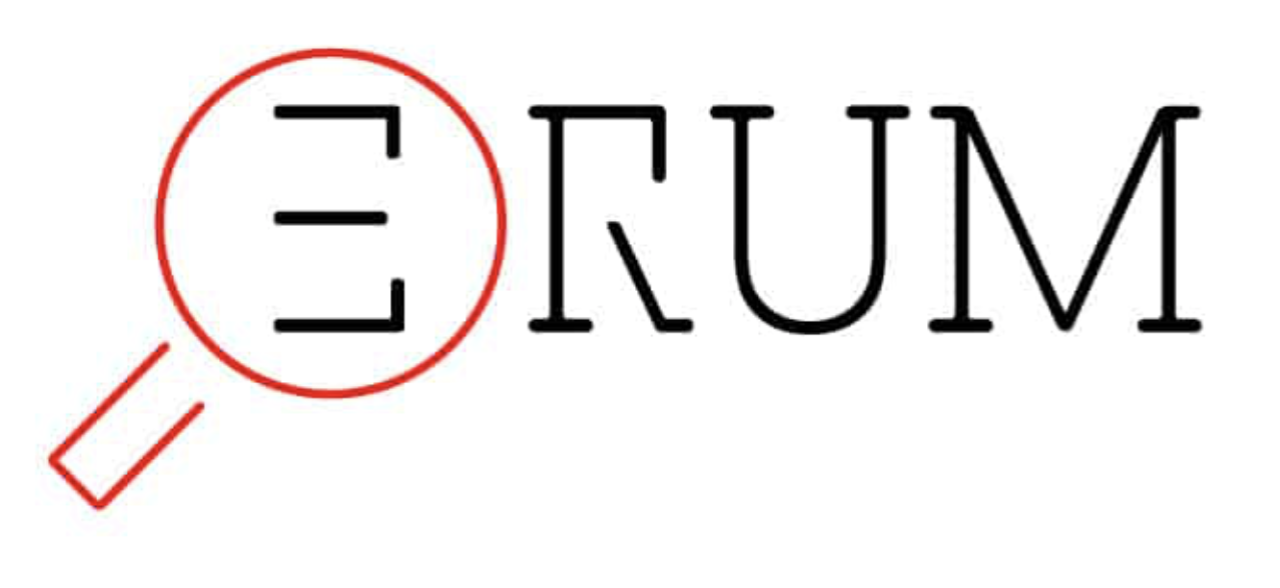
ERUM aims to develop a relevant transversal educational offer on the topic of “quality of information between mis- and disinformation today”. The project seeks for higher education students who contribute to the shaping of the present and future of the information and knowledge society. The core objectives of the project lie in the quality of information today, between mis- and disinformation or so-called “fake news”.
Foreseen outcomes:
- To improve the educational offer on the topic of quality of information in higher education and equip students with transversal skills that are necessary for the exercise of democratic citizenship.
- To foster structured collaboration between higher education and media and contribute to the policy discussion about the role of universities and media in the knowledge and information society.
- To improve the quality of information with regards to research-based communication.
Coordinator: Universität Wien
Partners: University of Vienna (Austria) │ University of Alcalá (Spain) │ Aristotle University of Thessaloniki (Greece) │University of Versailles (France) │ Vytautas Magnus University (Lithuania) │ Cyprus University of Technology (Cyprus) │ EUF
Strategic Partnership, Key Action 2
Start Date: 01/11/2019
End Date: 31/05/2022
Contact person at the UAH: Carmen Santamaría
NORM-Making Mobility the Norm
Improve students’ mobility in studies | Internationalization of HEIs | Design conscious internationalization strategies
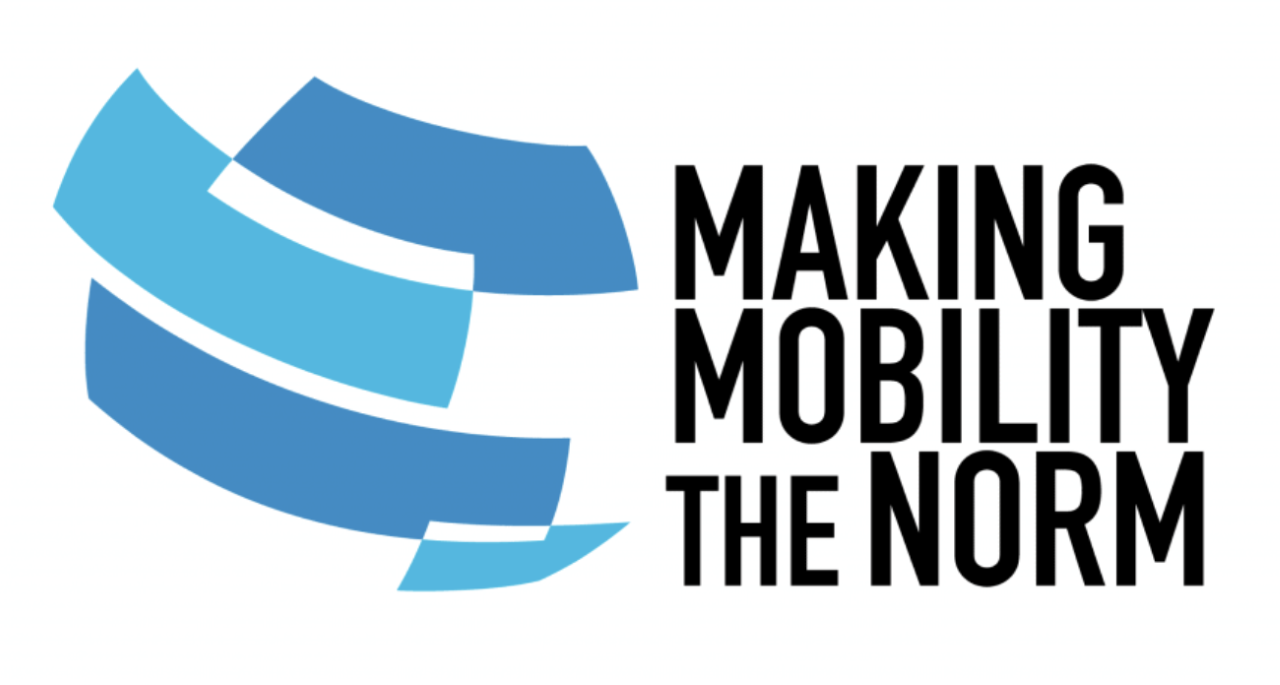
The Project Making Mobility the Norm aims to improve the quality of students’ mobility ensuring successful mobility periods in studies and recognition of credits in adequately designed degree programs. It focuses on the central obstacles to student mobility; the student structures at the HEIs and, in an institutional level, the national legislation and regulatory frameworks.
Foreseen outcomes:
- To map out the existing mobility structure and strategies that are already in place and to identify good practices and the main barriers and challenges to establishing mobility as the norm.
- To identify good practices and the main barriers and challenges to establishing mobility as the norm and to identify their disciplines, accreditation bodies and national regulations
- To formulate a mobility typology and recommendations, resulting in a European Curricula Design Guide, as well as, prototyping a curricula-matching digital tool Consortium.
Coordinator: Philipps-Universität Marbug (Germany)
Partners: University of Marbug (Alemania) │ University of Barcelona (España) │ University of Alcalá (España) │ Eötvös Loránd University (Hungaria) │ Vytautas Magnus University (Lituania) │ Aristotle University of Thessaloniki (Grecia) │ University Versailles Saint-Quentin-en-Yvelines (Francia) │ European University Foundation (Luxemburgo) │ Erasmus Student Network (Bélgica).
Strategic Partnership, Key Action 2
Start Date: 01/10/2019
End Date: 30/06/2022
Contact person at the UAH: Francisco Manuel Sáez de Adana
OLA 3.0 - Online Learning Agreement 3.0
Digital Mobility | Erasmus+ mobilities | ICT tools
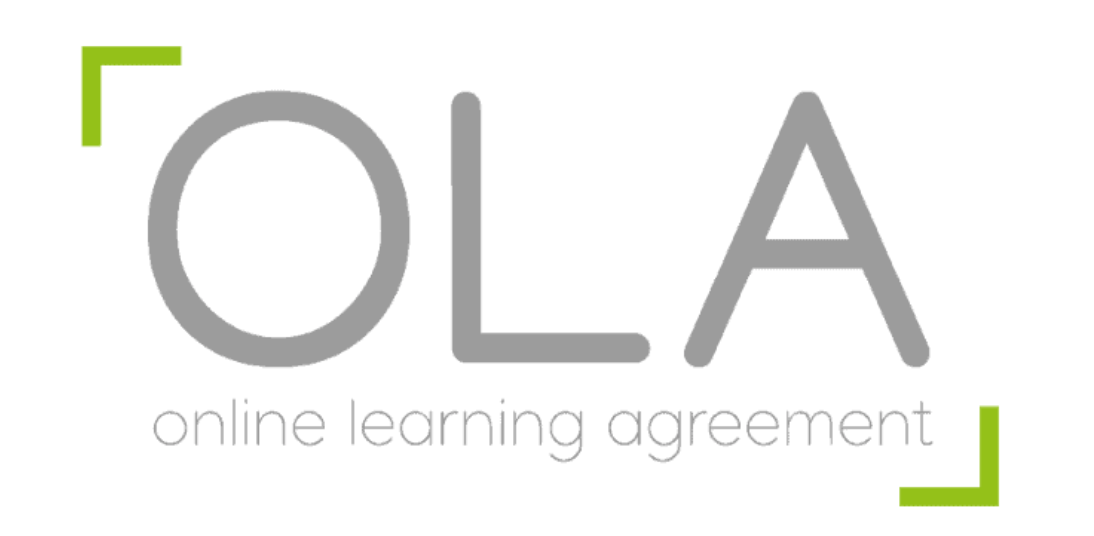
The project Online Learning Agreement will contribute to a major innovation in the European Higher Education Area, by changing the way HEIs handle the organization of mobility flows and paving the way towards a harmonious and streamlined mobility management.
Its results will play a crucial role in streamlining the Erasmus+ administrative workflows and the innovation of the HEIs.
Foreseen outcomes:
- To create less time-consuming mechanisms for HEIs to manage all mobility flows.
- Successful implementation of the state-of-the-art IT technologies and an outline of foreseeable future perspectives in applying modern IT technologies in the HE workflows.
- To create easier access to a full range of mobility programmes.
Coordinator: European University Foundation (Luxembourg)
Partners: University of Luxembourg (Luxembourg) | Aristotle University of Thessaloniki (Greece) │ University of Vienna (Austria) | University of Marburg (Germany) | University of Alcala (Spain) | Paris 1 Panthéon-Sorbonne University (France) | University of Bergen (Norway) | Erasmus University of Rotterdam (Netherlands) | University of Warsaw (Poland) │ Erasmus Student Network (Belgium)
Start date: 01/09/2019
End date: 30/04/2022
Contact person at the UAH: Ignacio Bravo
ErasmusX
ONLINE COURSES FOR MOBILE STUDENTS
Online courses | ICT and digital skills | Student Mobility | Online Educational Resources

Summary:
ErasmusX project aims to create a catalogue of online courses for incoming and outgoing Erasmus students. In addition to that, ErasmusX project will explore ways how to establish a common system of certification and recognition of online courses, this way allowing exchange students to combine online and traditional on-site courses with possible hands-on learning experience in companies abroad (via part-time placements).
Foreseen Outcomes:
- To enrich student mobility experience by offering a set of online courses.
- To improve digital skills of the academic staff involved in the project by jointly developing a set of complementary online courses.
- To establish functional scheme that allows to recognise online courses as part of the study Learning Agreements.
Coordinator: Universidad de Alcalá (Spain).
Consortium Partners: UNIVERSITA DEGLI STUDI DI NAPOLI FEDERICO II (Italy) | POLITECHNIKA LODZKA (Poland) | LATVIJAS UNIVERSITATE (Latvia) | EUROPEAN UNIVERSITY FOUNDATION-CAMPUS EUROPAE (Luxembourg).
Project details:
Total approved budget: 263.155, 00 EUR
UAH approved budget: 70.226,00 EUR
Key Action: Cooperation for innovation and the exchange of good practices
Action Type: Strategic Partnerships for higher education
Project Reference: 2018-1-ES01-KA203-050886
Erasmus Project Result: https://erasmus-plus.ec.europa.eu/projects/eplus-project-details#project/2018-1-ES01-KA203-050886
Project website: https://erasmusxproject.github.io/about.html
Courses Catalogue website: https://erasmusx.uni-foundation.eu/
Start Date: 01-09-2018
End Date: 31-12-2021
Contact person at the UAH: Mercedes Burguillo Cuesta. (mercedes.burguillo@uah.es)
POWER - Placement Opportunities with Entrepreneurial Reach
Placements at European start-ups | Entrepreneurship skills and mindset | Student Mobility | Cooperation between Universities and EU-wide incubators

The project Placement Opportunities wiith Entrepreneurial Reach (POWER) aims to facilitate the establishment of a coherent, sustainable and EU-wide placement ecosystem, which is primarily focused on high impact placements with evident entrepreneurial elements. The project partners will work on creating modern, targeted and user-friendly ICT tools as well as on providing comprehensive guidance and support material (via blended trainings, webinars and guidelines) both to the academic and business worlds.
Foreseen Outcomes:
- A connected set of ICT tools for sharing and managing placements in start-ups
- Structured cooperation between the academic and non-academic worlds to support young entrepreneurial initiatives (via EU-wide campaigns, MA student placement scheme, ongoing mentoring and tutoring support)
- Fostering high impact placements and supporting the choice of entrepreneurial career paths
Coordinator: European University Foundation (Luxembourg)
Partners: University of Alcala (Spain)| Aristotle University of Thessaloniki (Greece) | University of Eastern Finland (Finland) | University of Latvia (Latvia) | Lodz University of Technology (Poland) | Technoport (Luxembourg) | Tetuan Valley (Spain) | Innovation Zone (Greece) | New Factory (Finland)
Knowledge Alliance, Key Action 2
Start Date: 01/11/2018
End Date: 30/10/2021
Contact person at the UAH: Maria Dolores Rodriguez Moreno
Coop4EDU
Cooperative Entrepreneurship | Educational Resources

Coop4EDU seeks to establish a sustainable European platform of collaboration among the cooperative movement and academia, through an EU-wide Strategic Partnership which aims at empowering HEIs to stimulate and support cooperative entrepreneurial initiatives by integrating the cooperative approach within the HEIs.
Foreseen Outcomes:
- Educational materials on cooperative entrepreneurship for Higher Education
- Internship opportunities in cooperative businesses for students
- Guidelines on the implementation of cooperative approach in Higher Education
- Increased cooperation between Higher Education Institutions and cooperative entrepreneurship
Coordinator: University of Alcala (Spain)
Partners: Cooperatives Europe (Belgium), European University Foundation (Luxembourg), University of Leuven (Belgium), Coopetic (France), University of Ioannina (Greece), and Co-operative College (United Kingdom)
Strategic Partnership, Key Action 2
Start Date: 01/09/2018
End Date: 31/12/2020
Contact person at the UAH: María Sarabia
LLOM - Learning Languages Online in the Age of Mobility
Mobile language learning | ICT and digital skills | Multilingualism | Student Mobility | Online Educational Resources
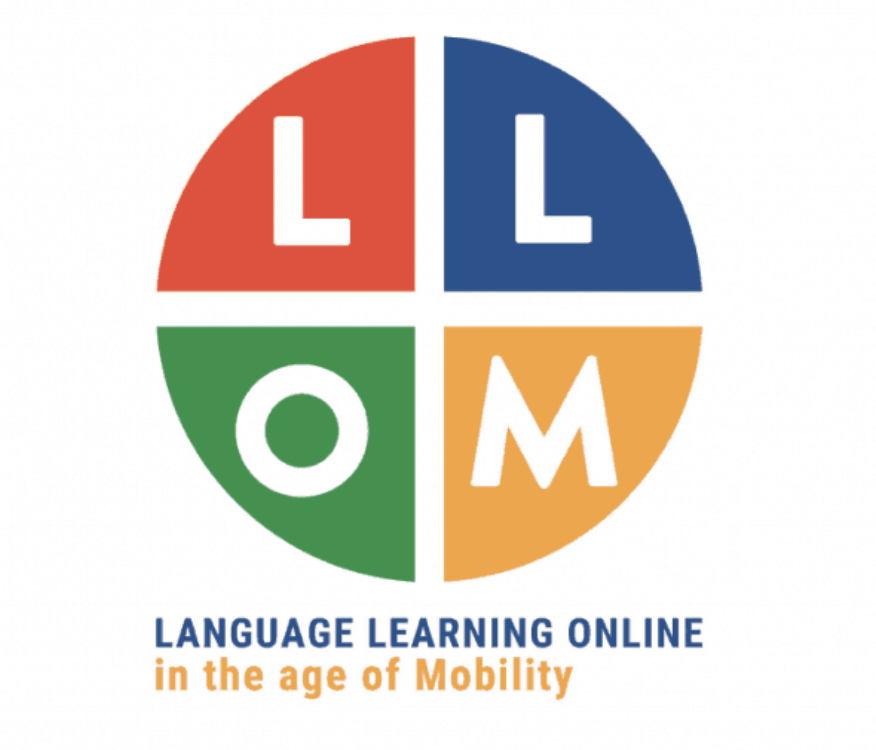
The project was developed in the context of promoting multilingualism and diversifying language teaching and learning opportunities in the EU. The project aims to equip teacher education students and in-service teachers with practical tools and methods for computer and mobile-assisted language learning opportunities (CALL and MALL) by designing and providing trainings, webinars and OERs. The project partners will also design and establish a sustainable and scalable framework for creating a high quality mobile language learning application.
Foreseen Outcomes:
- To equip teacher education students and in-service teachers with tools and methods for online language learning
- To establish a sustainable and scalable framework for creating a high quality mobile language learning App, this way increasing opportunities, diversifying and digitising language learning pathways
Coordinator: Universite Paris I Pantheon-Sorbonne (France)
Partners: University of Alcala (Spain) | Aristotle University of Thessaloniki (Greece) | University of Eastern Finland (Finland) | University of Vienna (Austria) | University of Lodz (Poland) | University of Aveiro (Portugal) | European University Foundation
Strategic Partnership, Key Action 2
Start Date: 01/09/2018
End Date: 31/08/2021
Contact person at the UAH: Carmen Santamaría García
TWE (Teach with Erasmus+)
International cooperation | Development cooperation | Staff mobility| Innovative methodologies for teaching

The Teach with Erasmus+ project (TWE) will tackle the accessibility and quality of teaching mobility by setting a framework that allows Higher Education Institutions (HEIs) to measure the quality of teaching mobility. Furthermore, the project consortium will prepare a catalogue of innovative pedagogical tools and methods.
Foreseen Outcomes:
- Erasmus+ Teaching Mobility Platform, as a place where institutions and teachers can offer and find teaching opportunities abroad
- Innovative framework to assess quality of teaching mobility
- A catalogue of pedagogical tools & methods
Coordinator: EOTVOS LORAND TUDOMANYEGYETEM
Consortium Partners: Eötvös Loránd University, University of Alcalá, UNICA - Network of Universities from the Capitals of Europe, Institut polytechnique UniLaSalle, EUF - European University Foundation
Datos del programa y ref. proyecto[1]:
Key Action: Cooperation for innovation and the exchange of good practices
Action Type: Strategic Partnerships for higher education
Project Reference: 018-1-HU01-KA203-047818
Erasmus Project Result: Erasmus+ project card | Erasmus+ (europa.eu)
Project website: https://teachwitherasmus.eu/
The intellectual outputs produced during the project can be found on the project website.
Erasmus+ Teaching Mobility Platform: https://teachingmobility.eu/
Start Date: 01/11/2018
End Date: 31/08/2021
Contact person at the UAH: Ignacio Rodríguez Álvarez (ignacio.rodrigueza@uah.es)
The Teach with Erasmus+ project received funding from the European Union’s Erasmus+ Programme under the project ID 2018-1-HU01-KA203-047818.
[1] Any other data required by the Project coordinator.
Erasmus X - Online Courses for Mobile Students
Online courses | ICT and digital skills | Student Mobility | Online Educational Resources

ErasmusX project aims to create a catalogue of online courses for incoming and outgoing Erasmus students. In addition to that, the project ErasmusX will explore ways how to establish a common system of certification and recognition of online courses, this way allowing exchange students to combine online and traditional on-site courses with possible hands-on learning experience in companies abroad (via part-time placements).
Foreseen Outcomes:
- To enrich student mobility experience by offering a set of online courses
- To improve digital skills of the academic staff involved in the project by jointly developing a set of complementary online courses
- To establish functional scheme that allows to recognise online courses as part of the study Learning Agreements
Coordinator: University of Alcala (Spain)
Partners: University of Naples Federico II (Italy) | Lodz University of Technology (Poland) | University of Latvia (Latvia) | European University Foundation (Luxembourg)
Strategic Partnership, Key Action 2
Start Date: 01/09/2018
End Date: 30/08/2021
Contact person at the UAH: Mercedes Burguillo Cuesta
Developing FL literacy in CLIL context (LIT4CLIL)
Literacy | CLIL | EFL | Primary Education
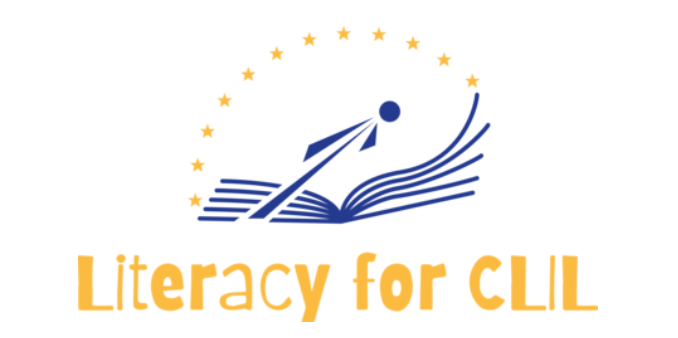
The project Developing FL literacy in CLIL context (LIT4CLIL) aims at developing and testing CLIL approach for primary EFL (years 3 to 5). The approach to be developed is based on the assumption that students need to develop their literacy skills in the foreign language (in this case, English) as much as in the mother tongue if they are to study content subjects through this foreign language.
The project designs and pilots a training course in literacy-based EFL teaching in which 10 teachers coming from the partner schools in each country will take part, who will then put the approach to language teaching itself to the test by designing, implementing and evaluating 10 units of work for EFL in grades 3 to 5 in transnational teams. Once the training course and the implementation of the literacy units have been evaluated, they will be transformed into a MOOC, thus making the training in literacy-based foreign language teaching available to teachers worldwide. The final stage of the project is designing a transnational FL literacy module that will be taught at partner universities as part of the Master’s programme.
The project aims to develop a teaching approach to English that has the potential of changing foreign language teaching as such, and of contributing to the development of a strong, cross-curricular approach to literacy development in schools. This, in turn, has the potential to place literacy development right at the centre of primary education curricula, which ultimately “is likely to significantly remove barriers to further education and training, and reduce social inequalities”. (EU High Level Literacy Group of Experts on Literacy 2012, p. 26)
Foreseen Outcomes:
- Needs analysis questionnaire about literacy teaching
- Report on dominant EFL teaching approach in CLIL, conceptualization of literacy and prior training
- Planning grid for literacy-based teaching units
- Pilot online course on literacy-based foreign language teaching
- Literacy-based teaching units
- Evaluation tool for pilot on-line course on literacy-based language teaching
- Repository of collected materials for literacy teaching
- Transnational modules for the Master’s programmes
- MOOC on literacy teaching
Coordinator: University of Warsaw (Poland)
Partners: University of Alcala (Spain) | University of Ljubljana (Slovenia) | Szkola Podstawowa Nr 11 im. I Dywizji Kosciuszkowskiej w Warszawie (Poland) | Colegio Zurbarán (Spain) Osnovna šola Preserje pri Radomljah (Slovenia) | Osnovna šola Ivana Tavčarja Gorenja vas (Slovenia) | Fundación Educación Marianista Domingo de Lázaro - Colegio Nuestra Señora del Pilar (Spain) | Ogolnopolskie Stowarzyszenie Dwujezycznosci Bilinguis (Poland)
Strategic Partnership, Key Action 2
Start Date: 01/10/2018
End Date: 30/09/2021
Contact person at the UAH: Ana María Halbach
OLA+
Digitalisation | Erasmus+ mobilities | ICT tools

The Online Learning Agreement+ (OLA+) project offers an innovative and sustainable tool to improve efficiency of mobility management. Creating streamlined and less time-consuming mechanisms for universities to manage mobility flows is among the key overall deliverables of the project. The OLA+ project outcomes are primarily targeted for IROs and Erasmus+ coordinators, who are the key actors involved in facilitating and managing such activities.
Outcomes:
- Online tool for Learning Agreement managem
- Training material and toolkit to explain the features and usage opportunities of the OLA+
- Analysis of Data Privacy for handling student data
Coordinator: European University Foundation (Luxembourg)
Partners: University of Luxembourg (Luxembourg) | Lodz University of Technology (Poland) | University of Vienna (Austria) | University of Marburg (Germany) | University of Alcala (Spain) | University of Bergen (Norway) | Erasmus University of Rotterdam (Netherlands) | Pantheon-Sorbonne University (France) | Erasmus Student Network (Belgium)
Strategic Partnership, Key Action 2
Start Date: 01/09/2016
End Date: 31/ 08/2019
Contact person at UAH: Ignacio Rodríguez
EUROPEAN PhD HuB
Research transfer | University and Industry cooperation | Doctorate studies

The European PhD Hub is an online electronic platform that will provide PhD students, Researchers and Universities with new cooperation and funding opportunities from both the public and private sectors. The project will connect universities, students and business at local and European level through an online platform for research and innovation.
Outcomes:
- Quality framework for university-business cooperation
- Online infrastructure to increase research opportunities and their transferability
- Application and mainstreaming of the European PhD Hub across Europe
Coordinator: European University Foundation (Luxembourg)
Partners: Aristotle University of Thessaloniki (Greece) | Euroconsultants SA (Greece) | Hellenic Petroleum SA (Greece) | University of Alcala (Spain) | Advantic Systemas SL (Spain) | Birmingham City University (United Kingdom) | Microsoft Research Ltd (United Kingdom) | University of Lodz (Poland) | LSI Software SA (Poland)
Knowledge Alliance, Key Action 2
Start Date: 01/09/2017
End Date: 31/ 08/2021
Contact person at UAH: Ignacio Bravo
AHEH (Arts and Humanities Entrepreneurship Hubs)
Arts and Humanities | University - Industry cooperation | Entrepreneurship

European arts and humanities students (A&H) tend to face challenges with accessing entrepreneurship opportunities. A&H Students come from a very different starting point, with education and skills that do not meet industry needs in an obvious way. The project brings together 14 partner institutions committed to improve the entrepreneurial capacity of A&H student by jointly designing, testing and disseminating an innovative programme for A&H staff and students.
Outcomes:
- 7 new A&H Entrepreneurship Hubs situated in partner faculties to foster the entrepreneurial skill-sets of A&H staff and students
- 3 training programmes: universities, A&H Students, Busi
- 3 manuals: Trainers, Users, AHEH Management
- 2 contextual reports: Academic & Business
Coordinator: University of Wales Trinity Saint David (United Kingdom)
Partners: Costal Housing Group Limited (United Kingdom) | Link Campus University (Italy) | Materahub (Italy) | The Faculty of Humanities and Social Sciences in Rijeka (Croatia) | Drugo More (Croatia) | Innogate to Europe (Spain) | University of Alcala (Spain) | University of Porto (Portugal) | UPTEC (Portugal) | XAMK (Finland) | Pink Eminence (Finland) | Institute of Technology Carlow (Ireland) | Carlow Arts Centre LTD (Ireland)
Knowledge Alliance, Key Action 2
Start Date: 01/01/2018
End Date: 31/ 12/2021
Contact person at UAH: Carmen Santamaría García, Ignacio Rodríguez
DIGITAL SKILLS ACCELERATOR
Digital Skills | Students Trainings

Defining the digital skills that should be prioritized by current and future cohorts of Higher Education students, and create a self-directed multimedia learning system that students can access to bolster their skills in specific areas.
Outcomes:
- Digital Skills Report, identifying the most valuable digital skills required professionally
- Online self-assessment tool
- Essential Digital Skills Toolkit
Coordinator: The West Pomeranian University of Technology in Szczecin (Poland)
Partners: University of Alcala (Spain) | Canice Consulting Limited UK (United Kingdom) | Momentum Marketing Services Ireland (Ireland) | EUCEN Belgium (Belgium)
Strategic Partnership, Key Action 2
Start Date: 01/10/2017
End Date: 30/09/2019
Contact person at the UAH: Miguel Ángel Sicilia Urban
PENS
Bologna Process | Enterprise Systems Engineering | Curricula Development
The PENS project seeks to build capacities to develop new curricula in enterprise systems engineering as a new undergraduate program, using a student-centered adaptive learning approach. The project partners will develop eight courses and four tutorials. These new pathway in Enterprise Systems Engineering will be deployed at the four participating partner universities, two in Palestine and two in Tunisia. The uniqueness of this approach is in meeting the multidisciplinary needs of the two domains (engineering and system thinking).
Coordinator: The Board of Trustees of the Birzeit University (Palestine)
Partners: Middlesex University Higher Education Corporation (United Kingdom) | University of Alcala (Spain) | University of Cagliari (Italy) | Al-Quds University (Palestine) | Al-Andalus Software Development and Technology I.C.D (Palestine) | University of Sousse (Tunisia) | University of Monastir (Tunisia) | Proxym IT (Tunisia)
Capacity Building, Key Action 2
Start Date: 15/10/2017
End Date: 14/10/2020
Contact person at the UAH: Salvador Sánchez Alonso
C3QA
3rd Cycle Studies | Quality of Doctoral Studies| Spreading EU Doctoral methods
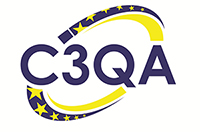
Promoting Internationalization of Research through establishment of Cycle 3 quality assurance system in line with the European Integration (C3QA) project seeks the development of a knowledge-based society in partner countries through the launch and operationalization of a robust quality assurance system for internationalization of Cycle 3 programs.
Outcomes:
- Best practices in Doctoral Studies both in EU and non-EU countries
- Development of a Doctoral framework in: Armenia, Ukraine, Mongolia and Kazakhstan
- Adaptation of non-EU national policies of Doctoral Studies aligned with EU strategies
Coordinator: French University in Armenia Foundation
Partners: Ministry of Education and Science of the Republic of Armenia (Armenia) | National Center for Professional Education QA Foundation (Armenia) | Yerevan State Academy of Fine Arts (Armenia) | Yerevan State University (Armenia) | High Council for Evaluation of Research and Higher Education (France) | University of Auvergne (France) | Jean Moulin University Lyon 3 (France) | Independent Kazakhstan QA Agency for Education (Kazakhstan) | Kazakh Humanities and Law University (Kazakhstan) | M.Auezov South Kazakhstan State University (Kazakhstan) | Ministry of Education and Science of Kazakhstan (Kazakhstan) | Ministry of Education and Science of Mongolia (Mongolia) | Mongolian National Council for Education Accreditation (Mongolia) | National University of Mongolia (Mongolia) | Otgontenger University (Mongolia) | Jan Kochanowski University (Poland) | University of Alcala (Spain) | Kyiv National University of Trade and Economics (Ukraine) | Ministry of Education and Science of Ukraine (Ukraine) | Simon Kuznets Kharkiv National University of Economics (Ukraine)
Capacity Building, Key Action 2
Start Date: 01/10/2016
End Date: 30/09/2019
Contact person at the UAH: Alfredo Gardel Vicente, José Luis Lázaro Galilea
CAPQI
Quality Internships | Transparency | University - Industry cooperation
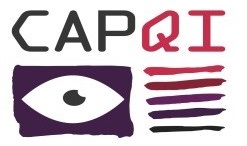
The Collective Awareness Platform for Quality Internships (CAPQI) project seeks to develop an online rating system where young people can rate their internships and employers can assess the quality of their internship programme. Supporting students´ transition from education to the labour market, improving transparency of internship programmes in Europe and creating tools to perform quality check of the internships are among the core goals of the CAPQI project.
Outcomes:
- Best practices book on of quality internships
- User-powered platform for rating internships
- Analytical report to steer policy debate and foster further improvements for quality internships
Coordinator: University of Alcala (Spain)
Partners: European University Foundation (Luxembourg) | Erasmus Student Network (Belgium) | InternsGoPro (Germany) | Polytechnic of Porto (Portugal) | Institute inter.research e.V. (Germany) | Fulda University of Applied Sciences (Germany)
Strategic Partnership, Key Action 2
Ref: 2016-1-ES01-KA203-025562
Start Date: 01/09/2016
End Date: 31/12/2018
Contact person at UAH: Ignacio Bravo, Alfredo Gardel Vicente
HOMO’POLY
Homosexuality | Diversity | Secondary & Tertiary Education

Homo'poly aims to contribute towards better understanding of homosexuality in secondary and tertiary education. Taking a cross-sectoral approach, the project is active in eight countries, working closely with a participating university and secondary school in each. Homo’poly aims to help establish an intercultural dialogue on gender equality, with the aim of strengthening acceptance and a better understanding of homosexuality.
Outcomes:
- Country-specific and comparative study about situation of homosexuality
- Two curricular e-learning toolkits for universities
- Didactic material for secondary schools
Coordinator: Maastricht University (Netherlands)
Partners: University of Szeged (Hungary) | University of Alcala (Spain) | University of Derby (United Kingdom) | KU Leuven (Belgium) | Gymnasium Kirchheim (Germany) | Sint-Paulus (Belgium) | Mannigfaltig (Germany) | Piter Jelles !mpulse (Netherlands) | I.E.S. Alejo Vera (Spain) |The Long Eaton School Academie Trust (United Kingdom) | Mannigfaltig,Institut für Jungen- und Männerarbeit (Germany) | Akademia Pomorska w Slupsku (Poland) | Gimnazjum nr 5 im. Sejmu Polskiego w Slupsku (Poland) | İzmir Ekonomi Universitesi (Turkey)
Strategic Partnership, Key Action 2
Start Date: 01/09/2016
End Date: 31/ 08/2019
Contact person at UAH: Carmen Santamaría García
BEST+
Blended Training | IRO staff | Digitalisation
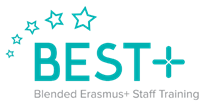
Supporting IROs to cope with the new challenges of increased mobility, the evolution of mobility schemes and the digital development in mobility management, through blended staff trainings.
Outcomes:
- Blended Staff learning platform
- 3 Courses (Intercultural competences, International attractiveness of universities, International student experience)
- Guidelines for Blended Learning Material
Coordinator: University of Alcalá
Partners: European University Foundation (Luxembourg) | Erasmus Student Network (Belgium) | University of Latvia (Latvia) | University of Eastern Finland (Finland) |University of Lodz (Poland)/p>
Strategic Partnership, Key Action 2
Start Date: 01/09/2016
End Date: 01/11/2018
Contact person at the UAH: Carmen Santamaría García
AToM
AAccess to Master Degrees | Student Trainings

The project provides free online and offline Access To Modules (AToM) to study master's courses in Europe. The AToM platform allows candidates to assess their suitability for Masters courses and, where required, provides them with self-study modules to help them prepare for their application and the course.
AToM modules are designed to help universities in attracting suitable students. The course content helps the potential students to understand the requirements of the master's course and allows them to prepare for the course by developing the right skills required for specific courses.
Outcomes:
- Web tool to host free online and offline modules
- Development of the access module pedagogy
- Free online and offline modules to study Master Courses
Coordinator: University of Borås (Sweden)
Partners: University of the Highlands and Islands (United Kingdom) | University of Alcala (Spain) | Digital Connections Ltd (United Kingdom)
Strategic Partnership, Key Action 2
Start Date: 01/09/2016
End Date: 31/08/2019
Contact person at the UAH: Manuel Rosa, Marta Marrón
#EMPL-OI
Student Mobility | Part-time Placements | Internationalization | Social Entrepreneurship
The project #empl-oi (European Mobility Placements for Open Innovation) aimed to create favourable circumstances for students to earn competences, which are highly valued in the labour market and thus considerably increase the employability of prospective graduates. The ultimate vision of the project was to create structured, favourable and mutually beneficial ecosystem for transnational University-Business cooperation and study models that require students to act across traditional boundaries.
Outcomes:
- Innovative collaboration structure
- Part-time placement scheme for local and international students
- Open online course on social entrepreneurship
- Guidelines for companies and universities on effective collaboration
- Policy recommendations
Coordinator: University of Nice Sophia Antipolis (France)
Partners: European University Foundation (Luxembourg) | University of Naples Federico II (Italy) | University of Lodz (Poland) | University of Alcala (Spain) | Vytautas Magnus University (Lithuania) | Erasmus Student Network (Belgium) | Advanticsys (Spain) | UAB Festo (Poland) | Lithuanian business confederation (Lithuania)
Strategic Partnership, Key Action 2
Start Date: 01/09/2015
End Date: 31/08/2018
SPIRAL
Quality of teaching | Schools | Competence Framework | Education
Project SPIRAL aims to improve the quality of training programmes for future primary school teachers through a common reference framework containing evaluation grids, a quality charter, a competence framework, skill cards as well as a mobility guide. All tools will be compatible with respective European and national teaching systems.
Outcomes:
- Situational survey on training programmes
- European competence framework
- Online collaborative platform
- Impact study on mobility for teacher-trainees in Europe
- Policy recommendations at national and European levels
Coordinator: Centre International d’Études Pédagogiques - CIEP (France)
Partners: University Paris-Sorbonne - Paris IV (France) | University of Caen Normandy (France) | University of Brighton (United Kingdom) | University of Alcala (Spain) | University of Hamburg (Germany) | HAN University of Applied Science (Netherlands)
Strategic Partnership, Key Action 2
Start Date: 01/09/2015
End Date: 31/08/2018
HEAL+
Master’s Studies | Health | IT
Developing a curriculum for Master’s studies in Health informatics implemented in the MENA region in three partner countries, and enabling graduates to employ information technology in the health care organization and towards fulfilling the medical market and health demands and challenges.
Outcomes:
- Twelve courses in health informatics using innovative education methodology
- Training modules about health informatics (medical records management, health analytics, and data processing)
- A repository of Open Educational Resources (OER) on health informatics educational and training material
Coordinator: University of Alcalá
Partners: Al-Quds University (Palestine) | University of Amsterdam (Netherlands) | The University of Jordan (Jordan) | Birzeit University (Palestine) | Stockholm University (Sweden) | Ain Shams University (Egypt) | Jordan University of Science and Technology (Jordan) | Cairo University (Egypt) | Dimensions Consulting (Palestine)
Capacity Building, Key Action 2
Start Date: 01/10/2015
End Date: 30/09/2018
ACAI-LA
Open & Accessible Education | Disadvantaged Population | Modernization of HE
Modernizing the virtual higher education, ensuring its quality, innovation in pedagogical methodologies, promoting the development of qualifications for the job placement of graduates and updating the resources of Latin American universities.
Outcomes:
- Modernization of technological resources in partner universities
- Creation and update of programs to grant accessibility of disadvantaged people
Coordinator: University of Alcalá
Partners: Universidad Americana (Nicaragua) |Universidad Nacional Autónoma de Nicaragua, León (Nicaragua) | Universidad del Magdalena (Colombia) | Católica del Norte Fundación Universitaria (Colombia) | Universidad Panamericana (Guatemala) | Universidad Galileo (Guatemala) | Universidad Nacional del Litoral (Argentina) | Universidad Nacional de Córdoba (Argentina) | Helsinki Metropolia University of Applied Sciences (Finland) | Università Telematica Internazionale UNINETTUNO (Italy)
Capacity Building, Key Action 2
Start Date: 15/10/2015
End Date: 14/10/2018
e-CF COUNCIL
Quality Assurance | Vocational Education
Creating a transnational partnership between the major players responsible for IT professionals’ enhancement. Developing a common reference scheme for joint qualifications and assessment according to the ESCO IT occupations, fostering social dialogue and establishing governance mechanism.
Outcomes:
- Implementation of 15 e-competences from the eCF (EN16234) into learning unites
- A joint vocational qualification based on ESCO IT occupations
- Developing ESCO/eCF-based competence certifications
Coordinator: Fondazione Politecnico di Milano (Italy)
Partners: Adfor (Italy) | Federazione Impiegati Operai Metallurgici (Italy) | ESI Center Eastern Europe (Bulgaria) | Bulgarian Association of Software Companies (Bulgaria) | DIGITALEUROPE (Belgium) | bITa Center (Netherlands) | CIONET (Netherlands) | EXIN (Netherlands) | University of Alcala (Spain) | Community of Madrid (Spain) | Federación de Servicios de Comisiones Obreras (Spain) | European Digital SME Alliance (Belgium) | CNA ICT (Italy) | CEFRIEL (Italy) | National Agency for Vocational Education and Training (Bulgaria)
Sector Skills Alliances in VET, Key Action 2
Start Date: 01/11/2015
End Date: 31/10/2018
#EUROPEHOME
Part-time Placements | Entrepreneurship skills | Student Mobility | Internationalization
Project #europehome proposed, designed and piloted a model of a win-win cooperation and a structured framework which involved three target actors (Universities, Employers and Students). The goal of the project was to address the challenge of student employability and the need of increasing the relevance of higher education. The project primarily focused on enhancing graduate employability by combining studies and work abroad.
Outcomes:
- Unique cross-border placement scheme for students (local and international)
- Innovative collaboration structure between universities and business representatives
- Learning material and e-modules on entrepreneurship
- Guidelines for educators
- Policy recommendations
Project results are available here.
Coordinator: University of Alcala (Spain)
Partners: European University Foundation (Luxembourg) | Aristotle University of Thessaloniki (Greece) | University of Aveiro (Portugal) | University of Latvia (Latvia) | Lodz University of Technology (Poland) | Collective Intelligence Centre (Latvia) | Erasmus Student Network (Belgium)
Strategic Partnership, Key Action 2
Start Date: 01/09/2014
End Date: 31/08/2017
M-COMMERCE
ICT | Digital Competences | Enterprise | Entrepreneurship
Focusing on the training of staff and employees of Small and Medium-sized Enterprises (SMEs) in order to develop the further development and expansion of m-commerce activities.
Outcomes:
- Collection of best practices from different regions
- Teaching and learning materials for m-commerce training
- Implementation of training courses in all seven partner countries
Project results are available here.
Coordinator: FH JOANNEUM (Austria)
Partners: Technology Park Ljubljana (Slovenia) | Center for Knowledge Management (Republic of Macedonia) | University of Alcala (Spain) | Politehnica University of Timișoara (Romania) | Eurosportello del Veneto (Italy) | Johanneberg Science Park (Sweden).
Strategic Partnership for VET, Key Action 2
Start Date: 01/10/2014
End Date: 30/09/2016
OpenQAsS
Quality Assurance | Vocational Education
Improving quality assurance in European VET systems within the context of the implementation of the European Quality Assurance Reference Framework.
Outcomes:
- Interactive manual on educational quality assurance systems
- Software toolkit for managing institutions QAs
Project results are available here
Coordinator: iTStudy Hungary Ltd. (Hungary)
Partners: CAPDM Limited (United Kingdom) | SZÁMALK-Szalézi High School (Hungary) | Associazione Italiana per l'Informatica e il Calcolo Automatico (Italy) | ICS Skills (Ireland) | TREBAG Ltd. (Hungary) | University of Alcala (Spain) | National Research Council (Italy)
Strategic Partnership for VET, Key Action 2
Start Date: 01/09/2014
End Date: 31/08/2017

